6 Volumes
Culture: The Flavors of Philadelphia Life
Philadelphia began as a religious colony, a utopia if you will. But all religions were welcome, so Quakerism mainly persists in its effects on others, both locally and in America, in Art, clubs, and the way of life.
History: Philadelphia and the Quaker Colonies
Philadelphia and the Quaker Colonies
Religion
New volume 2012-07-04 13:22:31 description
Quaker Philadelphia 1683-1776
New volume 2012-11-21 17:33:18 description
Pre-Revolutionary Ben Franklin
Poor Richard was able to retire at the age of 42, and spent the rest of his life as a rich man, dying at the age of 82 with an eye-popping estate.
Surviving Strands of Quakerism
Of the original thirteen, there were three Quaker colonies, all founded by William Penn: New Jersey first, Pennsylvania biggest, and Delaware so small Quakerism was overcome by indigenous Dutch and Swedes.
Quakers: William Penn
Although Ben Franklin gets more ink lately, William Penn deserves at least equal rank among the most remarkable men who ever lived.
It would take a William Shakespeare to do justice to the nobility, shrewdness, and tragedy of Pennsylvania's founder. Somehow, William Penn's greatness was better appreciated during the 19th Century, as the statue atop Philadelphia's City Hall attests. For example, it defies imagination to understand how this intellectual religious dissenter could persuade the devious and licentious King Charles II to give him land which exceeded the size of England itself; remember, Charles had fourteen illegitimate children and no legitimate ones, often bringing multiple mistresses to social occasions. Penn eventually had thirteen quite legitimate children himself, but his whole image was that of a dedicated family man, quite another thing. Willing to go to jail rather than retreat from pacifist beliefs, Penn nevertheless had been famous as a swordsman. Later in life he won the admiration of the Indians with his prowess as a broad-jumper; he was neither a coward nor a weakling. He persuaded followers from several nations to take the dangerous ocean passage to settle in America, and persuaded speculators with strong gambling instincts to invest in property there. He wrote thousands of pages of insight into theology and significantly revised the loosely dissident ideas of the early Quakers into a coherent religion. His penetrating insights into the very basics of English law are still taught in law school. It was trust in him personally which mainly persuaded the Indians to remain peaceful co-inhabitants of his three colonies; much of their trust in him was based on admiration for his athletic prowess. And he was a realist; no white settlers were to enter his lands until they had made peace with the Indians, even if that meant buying the land three times over. When he offered religious freedom, it was freedom for everyone, not just one dominant group of zealots as in other colonies. But if King Charles (who turned Catholic on his deathbed) insisted that politics demanded no Catholics be admitted to the colony, Penn understood what he must do and kept the bargain. He was so immensely rich he could afford to lose money on his colony; it never seems to have occurred to him to apologize for his obvious wealth. Or his friendship with controversial Kings. When the King was dethroned in the "Glorious Revolution" of 1688, overtrust was exposed as his greatest personal weakness.
The end of his life was a tragedy of betrayal. He had to return to England when his steward fleeced him and got Penn thrown in jail for it. His heirs abandoned the Quaker religion he had more or less founded, and they lived a dissolute life at Court, releasing their colonial agents to exploit his commitments with the Indians. The Protestant colonists, mostly Presbyterian, to whom he had extended religious freedom, treated his peaceful principles with contempt, bringing Indian massacres down on their own heads. The Quaker colonists for their part did their best to resist his wishes and influence while he was away embattled in England. Fifty years after his death, the Pennsylvania Quakers withdrew from politics entirely, unable to run a pacifist colony without him.
William Penn, Excellent Lawyer, Terrible Businessman
Richard Dunn, who with his wife Mary Maples Dunn stand as the two core authorities on the life of William Penn, merely smiles when asked to describe what Penn was really all about. "What we need is to have one good biography emerge," said he, "but it isn't easy to guess what it will say". For the present, let's just sketch a few paradoxes which somehow need threading together.
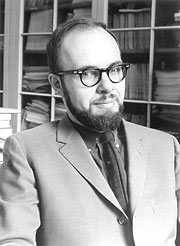
|
| Richard Dunn |
In the first place, the wealth of William Penn can only be described as prodigious. His father had played a central role in restoring the Stuart monarchs, and in the course of it had conquered for the Crown the enormously valuable property of the Island of Jamaica. For these efforts, the father had been rewarded with extensive properties in Ireland and a highly influential position at Court. To all of this was overgenerously added as debt repayment, the American territories which have now become the states of Delaware, New Jersey, and Pennsylvania. Actual ownership of some of this was shared with others, but all of it was quite effectively controlled by young William. No one else stands even close as the largest private landholder in American history. But to appreciate the immensity of his wealth, it should be understood that he treated this property as a sort of hobby. Over the course of his lifetime, the colonies lost money, and Penn subsidized them rather seriously from his other assets.
At the same time, Penn lived vastly beyond his income in ordinary ways, becoming heavily indebted, eventually going to debtor's prison. It probably was not necessary; his sons renounced Quakerism and made a profit on the colonies after they inherited them. Although he could display remarkable organizational talent, particularly in the organization of New Jersey, his management was mostly slack, his judgment of agents often proved too trusting, and he permitted himself to be exploited by poorly-designed contracts to his eventual financial ruin. Even that might not have been serious; he displayed a towering legal mind in the devising of the doctrine of jury nullification and was the winner in a great many lawsuits. He even demonstrated he was capable of winning dubious lawsuits, soundly defeating Lord Baltimore in a border dispute over Maryland which others have said showed Baltimore had the stronger case. We know he had influence at Court, and such legal victories suggest he might on occasion have taken full advantage of it.
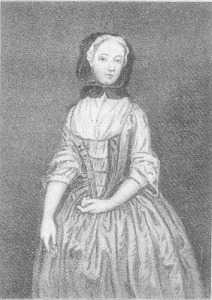
|
| Gulielma Maria Springett Penn |
From the sound of things, some have concluded Penn was so rich and powerful he grew careless about his own best interests, which essentially needed very little defense. In particular, he gave this impression to his fellow Quakers, who concluded he did not need nor likely would stoop to collecting what he was owed in taxes and property sales. This cavalier attitude encouraged the early Quaker merchants to follow their own advantage without shame, and as it happened with great vigor. The Constitutions he devised for the colonies are frequently cited as the brilliant cornerstones of fairness and stability, ultimately the models for much of our present Constitution. Penn really was sincere in wanting to provide a better life for the working people than they could have at home in England. But in the Seventeenth Century, the modest role he devised for the Proprietor commanded little respect and was not one his aggressive clients would have chosen for themselves in his position. Perhaps the most generous description of their passive aggression would be that he taught power and governance to be the collective possession of the whole Quaker meeting, so the leaders of the meeting simply took him at his word. For their part, there can be little doubt of their commercial talents; trade and industry immediately thrived in the colony. However, sharp, aggressive trade and commerce were not things a gentleman would himself want to associate with.
Unfortunately, the historical records of the early colonies are not good; for the most part, we have to surmise the struggles and frictions between a rich, financially careless, and sincerely earnest theologian in his contention with a group of poorly educated strivers who had been told he regarded each of them to be his equal. As the saying goes, he was rich beyond denying. And therefore, he was probably arrogant beyond his own ability to see it as a flaw.
Equal before the law, perhaps, and equal in the prayers of First-day Meeting. But everything about his upbringing, his social circle in London, and his staggering wealth suggested that even a saint would have trouble believing, deep in his heart, that these were truly his equals. And even if perchance he did believe it, they would not have believed it for a moment, had their positions been reversed. Penn certainly acted as though he believed in religious freedom, serene in the idea that if every person earnestly thought hard about ethical issues, everyone would eventually reach about the same conclusion. The elders of the meeting, however, behaved in ways which suggested they would personally prefer non-Quakers to settle somewhere else, and given half a chance would create Quakerism as an established church. There seemed to be those who felt that Friend William was perhaps a little too trusting. And anyway there were some obvious paradoxes. William Penn kept personal slaves.
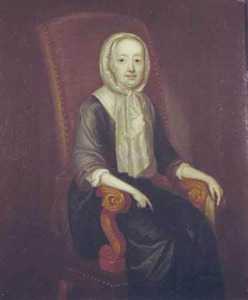
|
| Hannah Callowhill Penn |
With two wives, William Penn had thirteen children. Among them was considerable diversity of opinion, along with the same tendency to rebellion found in any two generations. Early illnesses and chance led to the emergence of those children who renounced Quakerism and showed no shame at all about wanting to have money in order to spend it recklessly. One would have supposed that a man of Penn's intellectual stature would have been able to control his family better, but his own reckless youth had been so extreme that he had few arguments available when, as seems virtually certain, rebellious children defended themselves by reminding him of his own indiscretions. William Penn displayed absolutely no sense of humor; a touch of it would have been useful in mastering a family and friends who were undoubtedly having a little trouble knowing what to make of this apparition in their midst. Some equally pompous Pennsylvania merchants might have had difficulty denying that in their passive aggression, they occasionally resembled the spoiled brats with whom he found he had ample family association.
REFERENCES
| Remember William Penn, 1644-1944: A Tercentenary Memorial : Edward Martin: ISBN-13: 978-1258369934 | Amazon |
The Ghost of William Penn
It is fair to say that Pennsylvania history was influenced by my parents, by their upbringing, and more particularly by me, by my becoming a member of the Religious Society of Friends. Fair, too, is the statement that Pennsylvanians should be aware of my life in the making, because it was the tick-tock that set into motion so much of what Pennsylvania stood for, and continues to stand for.
I mean: Pennsylvanians claim a keen conscience for religious tolerance and mankind's equality. Although my father would disagree, I affirm, the choices which urged me to became a Quaker were influenced by my early parental up-rearing. In mindset: Father steeped me to think for myself. He was rigid, true, and in many ways inflexible, brave for battle, but a loving parent, whose only parental weakness was a too strong firmness that I not take lightly my birthright social standing. Mother, she kept father straight in her gentle fashion. Starting at age ten I was a handful, but my mother never flagged in her trust that I would turn out right. She later accepted my devotion to Quakerism. I add: Historians have copied each other in one fallacy. Mother was not a Hollander. My mother was reared in Holland, but she was the daughter of an English business agent. I was born in 1644 London. My father was a seafaring man just as his father before him. My grandfather served as an able seaman on small and middling British ships. My father was enabled by his father's sea experience. Father advanced from Small, then to Middling, then to Great, and finally to the top vessels: Royal Ships.
In a rare instance of ability and perseverance my father became by stage re-rankings an Admiral, and through bravery, "Admiral, Sir William Penn." My father was a proud man. I was my father's only son, I bore his name, and he expected much of me.
My father did not marry as a young man. Seafaring and warring on the high seas did not permit it. With career rise, however, he was able meet my mother through her father's business; my grandfather being a resident of Holland, by partnership in a native English merchant firm. Mother had birthright standing; my father earned his. The marriage of my parents thrived and was both loving and agreeable. An only child son, I represented my father's progeny.
Moreover I was birthed to the favored class which my father had earned through bootstrap perseverance. I was privileged. In my teens my father wrote naval dispatches, and these I hand delivered to the Royal Court. My path was being set. In the telling I have skipped ahead.
My first ten years matched the last ten years of my father's sea-duty. In my first ten, my father had only shore leave twice. In his absence, under my mother and grandmother's care, I was an obedient son. With pangs, I recall missing my father. Dutifully, I was instructed in religious teachings. Per lessons I learned: Letter "A: With Adam's fall; we Sinned all." And so on. This lesson impacted the ABC's and facts about God. I was made wide eyed to God. God was made my life Lord companion.
My sudden misbehavior at the age of ten had everything to do with my father's relaxed arrival as a London based seaman; and would-be near parent. Father was rarely home. He was forever at the Admiralty Office. I misbehaved for attention.
My father as soon as manageable gained a residence on "Tower Hill." For aspiring men Tower Hill was the place to live in London. Slim in purse he bought the right location, but his slim purse reflected it. He bought a tall, narrow, confining home. Mother was of necessity pressed to do all the house work. Once she was eyed by a snippy person, who noted with disgust her working in a house dress, more over her stockings had fallen about her ankles. The dreary notice is one of the few insights historians have found relating to my mother, and it distresses me as unfair. She sacrificed so I might be properly educated. Simply, our Tower Hill address dictated a private home education and I was schooled by tutors. My Tower Hill family residence was hard facing to the Tower of London, with goal for lawbreakers. More than a place for social counting, Tower Hill held a reminder to residents that royal obedience was expected. It was dictum: A Royal favor that had been granted could be easily removed. A year residence in the Tower Hill might be followed by year or more in a Tower goal cell. My father was once placed therein, and I gained a cell on two occasions. Here is a truth be told:
It was uncertain when or if I would be released from my second jailing. Strings were pulled, I gained released, with bespoken assurances. I was expected to leave London and go as far away as possible. Expected it was, I would retreat and retire to the Penn family's manor estate in Ireland. Instead, instead I advanced thought in more distant terms. …Across the Atlantic.
For me: the thinly settled land opposite New Jersey took on an attraction. Yes, as a safe haven for Quakers and others persecuted for conscience misbehavior. Yes, also, as a safe haven for myself and my family, Somehow the last fact goes untold. Now I make it a truth-be-told: I skedaddled. It took time, but I skedaddled.
Yes. I did return to England in 1684, but only after Pennsylvania was an entity. Truth told: I exhibited a yellow streak in the going, but this was cleansed by my brave return in 1684. Back in England there were times I hid – I hid to live another day. Please blur what I just wrote, I wish to wind down pleasanter. As I have always wished, I wish Pennsylvanians shall keep up a keen conscience for religious tolerance and mankind's equality.
I affirm what I have told. I do not wish to over burden. I close.
Your Governor thanks you,
William Penn
Written by Thomas R. Smith, William Penn re-enactor
William Penn, Robert Barclay and the Ranters
 Before ranting, try to quake a little.
Before ranting, try to quake a little.

|
In both the 17th and 20th centuries, rejection of the rules of organized society was really a demand to have rules of behavior re-examined. Behind that, lay suspicion the world itself had greatly changed and needed new rules, or perhaps no rules. But in both cases, such restlessness eventually subsided after recognition that many minds had already faced the same issues, and had left a logical trail back to the same old conclusions. Oliver Wendell Holmes stated the matter effectively by intoning that "The life of the law has not been logic, it has been experience." In the case of science, experiments are discontinued when results are always the same. In the case of the common law, society's experiments in court are conducted by adversaries, so consensus takes longer. Both processes state the apparent logic, test it, and revise the logic to test it further; the goal is to reach a point where further questioning can subside. And the world can go on about its other business.
<Although Barclay, Penn and Pike mixed their conclusions together in several tracts, it seems likely that Barclay established the need for a gathered Quaker meeting, as contrasted with solitary meditation. A religion with no fixed dogma, except perhaps reliance on an inner light found in every man, and one which rejects appointing professional clergy, has difficulty preserving shared conclusions; it cannot grow. Reliance on the Bible, as one weighty Quaker gently put it, is to rely too heavily on faulty translations. The Catholic Church appointed priests. But in Protestant opinion, the Catholic tradition gradually wandered into the ceremony and inflexibly resisted going back to first principles. Barclay's identification of the sense of the gathered Meeting could begin with a blank slate. It would however constantly generate default positions, maintaining experiences that others had deeply contemplated. Without a meeting, even if not a word is spoken at it, Quakerism cannot thrive. Sitting at home alone is not the same as sitting in a silent meeting. Sooner or later, Quakers must sit together in a gathered community.
Some Quakers believe Barclay sometimes carried this reasoning too far. In his day, it was necessary to reject Catholic doctrines, while continuing to adhere to Protestant moral teachings. In a way, his position was similar to the American founding fathers just after ratifying the Constitution. It was essential for stability to maintain English common law until the new Republic had time to revise it, a process which took American courts several decades. The solution for Barclay was to go back to the writings of the Apostles prior to the Council of Nicaea in 325 AD. This helped manage the controversies of the 17th century, but has since raised uncertainty about how authentic the early records were, how inviolate they should now be considered.
William Penn, another close friend of the King, was also in a position quite unlike other Quakers. Whether from lack of concern for theology, or for more practical reasons, his position was as follows:
"...it is the root of Ranter-ism to assert, that nothing is a Duty incumbent upon thee, but what thou art persuaded is thy Duty...Although thou art not to conform to a thing ignorantly, yet thou art seriously to consider, why thou art ignorant..it then must needs to be in thyself, who has not yet received a sense for or against the matter, about which thou art in doubt."Penn's position seemed to be: before dissenting, examine the logic behind conformity.
Jury Nullification
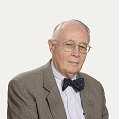 |
| Tom Monteverde |
We must be grateful to the late distinguished litigator, Tom Monteverde, for reminding us of the importance of the jury in American history. Juries seldom realize how much power they can have if they unite on a common purpose. In fact, juries have the implicit right to veto almost anything the rest of government does, by rendering it unenforceable. If the jury opinion is a majority view, nothing but a civil war can legally stop them. So it helped Washington to have jury nullification seem an invincible Quaker idea, while the South trusted a rich slave-owner who had renounced power.
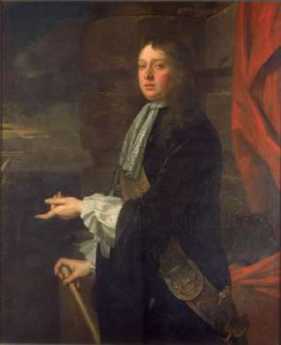 |
| William Penn |
The right to a jury trial originated in the Magna Carta in 1215, but a jury's essentially unlimited power was established four centuries later by Quakers. The legal revolution grew out of the 1670 Hay-market case, where the defendant was William Penn, himself. Penn was accused of the awesome crime of preaching Quakerism to an unlawful assembly, and while he freely admitted his guilt he challenged the righteousness of such a law. The jury refused to convict him. The judge thus faced a defendant who said he was guilty and a jury who said he wasn't. So, the exasperated judge responded -- by putting the jury in jail without food.
The juror Edward Bushell appealed to the Court of Common Pleas, where the problem took on a new dimension. The Justices certainly didn't want juries flouting the law, but nevertheless couldn't condone a jury being punished for its verdict. Chief Justice Vaughn decided that intimidating a jury was worse than extending its powers, so the verdict of Not Guilty was upheld, and Penn was set free. Essentially, Vaughn agreed that any jury that wasn't allowed to acquit was not really a jury. In this way, the legal principle of Jury Nullification of a Law was created. A verdict of not guilty couldn't make William Penn innocent, because he pleaded guilty. A verdict of not guilty, under these circumstances, meant the law had been rejected. Jury nullification thus got to be part of English Common Law, hence ultimately part of the American judicial system.
 |
| Andrew Hamilton |
This piece of common law was a pointed restatement of just who was entitled to make laws in a nation, whether or not nominally it was ruled by a king or a congress. Repeated British evasion of the principles of jury trial became an important reason the American colonists eventually went to war for independence, and probably a better one than some others. The 1735 trial of Peter Zenger was an instance where Andrew Hamilton, the original "Philadelphia Lawyer", convinced a jury that British law, blocking newspapers from criticizing public officials for improper conduct, was too outrageous to deserve enforcement in their court. In that case, jury defiance became even more likely when the judge instructed the annoyed jury that "the truth is no defense". Benjamin Franklin's Pennsylvania Gazette was here quick to come to the side of jury nullification, saying, "If it is not the law, it ought to be law, and will always be law wherever justice prevails." Franklin quickly became allied with Andrew Hamilton, who became Speaker of the Pennsylvania Assembly.
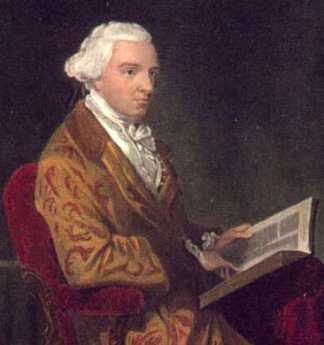 |
| John Hancock |
The Zenger case was often stated to be the origin of the Freedom of the Press in our Constitution fifty years later, but in fact the First Amendment merely provides that Congress shall pass no laws like that. Hamilton had persuaded the Zenger jury they already had the power to stop enforcement of such tyranny, and the First Amendment could be seen as trying to prevent enactment of laws that will foreseeably incite a jury to revolt.
The Navigation Acts of the British government, for example, were predictably offensive to the American colonists, whose randomly chosen representatives on juries were then rendered useless with their wide-spread refusal to convict. This, in turn, provoked the British ministry. John Adams made a particularly famous defense of John Hancock who was being punished with confiscation of his ship and a fine of triple the cargo's value. Adams was later singled out as the only named American rebel the British refused to exempt from hanging if they caught him. As everyone knows, Hancock was the first to step up and sign the Declaration of Independence, because by 1776 there was widespread colonial outrage over the British strategy of transferring cases to the (non-jury) Admiralty Court. Many colonists who privately regarded Hancock as a smuggler were roused to rebellion by the British government thus denying a defendant his right to a jury trial, especially by a jury almost certain not to convict him. To taxation without representation was added the obscenity of enforcement without due process. John Jay, the first Chief Justice of the Supreme Court of the newly created United States, ruled in 1794 that "The Jury has the right to determine the law as well as the facts." And Thomas Jefferson built a whole political party on the right of common people to overturn their government, somewhat softening, it is true, when he grasped where the French Revolution was heading. Jury Nullification then lay fairly dormant for fifty years. But since the founding of the Republic and the reputation of many of the most prominent founders was based on it, there was scarcely need for any emphasis.
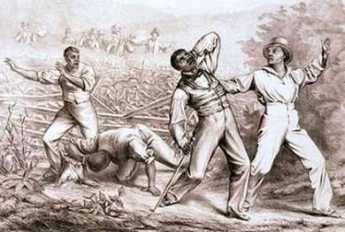 |
| Slave |
And then, the Fugitive Slave Law of 1850 began to sink in. It became evident that juries in the Northern states would routinely refuse to convict anyone under that law, or under the Dred Scott decision, or any other similar mandate of any branch of government. In effect, Northern juries threw down the gauntlet that if you wanted to preserve the right of trial by jury, you had better stop prosecuting those who flouted the Fugitive Slave law. In even broader terms, if you want to preserve a national government, you had better be cautious about strong-arming any impassioned local consensus. A rough translation of that in detail was that no filibuster, no log-rolling, no compromises, no oratory, no threats or other maneuvers in Congress were going to compel Northern juries to enforce slavery within their boundaries of control. All statutes lose some of their majesties when the congressional voting process is intensely examined, and public scrutiny of this law's passage had been particularly searching. Even if Southern congressmen would be successful in passing such laws, it wasn't going to have any effect around here. The leaders of Southern states quickly got a related message, and their own translation of it was, "We have got to declare our independence from this system of government that won't enforce its own laws". If juries can nullify, then states can nullify, and the national union was coming to an end. Both sides disagreed so strongly on this one issue they were willing, for the second time, to risk war for it.
Ku Klux Klan
The idea should be resisted that Jury Nullification is always a good thing. After the Civil War, many of the activities of the Ku Klux Klan were tolerated by sympathetic juries. Many lynch mobs of the Wild, Wild West were encouraged in the name of law and order. Prohibition of alcohol by the Volstead Act was imposed on one part of society by another, and Jury Nullification effectively endorsed rum-running, racketeering, and organized crime. The use of marijuana and abortion are two further examples where disagreement is so strong that compromise eludes us. What is at stake here is protecting the rights of a minority, within a society run by a majority. If minority belief is strong enough, jury nullification issues an unmistakable proclamation: "To proceed farther, means War."
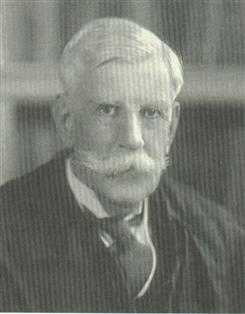 |
| Oliver Wendell Holmes |
That's a somewhat strange outcome for a process started by pacifist Quakers, so the search goes on for a better idea. Distinguished jurists differ on whether to leave things as they are. In a famous exchange, Oliver Wendell Holmes once had dinner with Judge Learned Hand, who on parting extended a lawyer jocularity, "Do justice, Sir, do justice." To which, Holmes then made the somewhat surly response, "That is not my job. My job is to apply the law."
Thus lacking any better approach, it is hard to blame the US Supreme Court for deciding this was something best left unmentioned any more than absolutely necessary. The signal which Justice Harlan gave in the majority opinion on the 1895 Sparf case was the very narrow ruling that a case may not be appealed, solely on the basis that the trial jury was not informed of its right to nullify the law in question. Encouraged by this vague hint, what has evolved has been a growing requirement that incoming jurors take an oath "to uphold the law", officers of the court (ie lawyers)are discouraged from informing a jury of its true power to nullify laws, and Judges are required to inform the jury in their charge that they are to "take the law as the judge lays it down" (ie leave appeals to higher courts). If a jury feels so strongly that it then persists in spite of those restraints, well, you apparently can't stop them. Nobody thinks this is a perfect solution, and aggrieved defendants like the Vietnam War protesters are quite vocal in their belief that the U.S. Supreme Court finally emerged with a visibly asinine principle: a jury does indeed have the right to nullify, but only as long as that jury is unaware it has that right. That's almost an open invitation to perjury if accurate; but while it's not precisely accurate, it comes close to being substantially true.
That's where matters stand, and apparently will stand, until someone finds better arguments than those of Benjamin Franklin, John Jay, Andrew Hamilton -- and William Penn.
Jersey
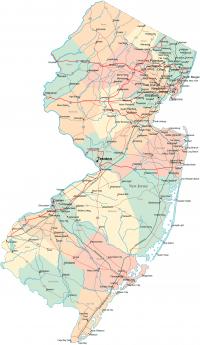
|
| Map of New Jersey |
Once you notice the oddity of salt water in the lower reaches of the Delaware and Hudson rivers, it gets easier to understand the current theory that southern New Jersey was once an island. Like Long Island, it was separated from the mainland by a sound, but in the Jersey case the sound silted up from Trenton to New Brunswick, creating a new peninsula of "West" Jersey by uniting the island with the mainland. The colony was named after the island of Jersey off the coast of England, a gesture for Sir George Carteret, who was given the American area out of gratitude for once sheltering the exiled royal brothers Charles II and James from Cromwell, in that other Jersey. Cape May was probably a second distinct island later joined to the larger one by the transformation of the silted ocean into the bogs of the Maurice River. Cape May started as a whaling community, populated by Quakers from New York and New England, who always maintained a social distance from the Philadelphia Yearly Meeting. The long Atlantic beaches of New Jersey now repeat the main geological process, with successive generations of barrier islands first heaved up by the ocean and then packed against the mainland, filling up the brackish bay. The cycle of forming and packing successive barrier islands takes about three hundred years before a new one starts. In a larger sense, the process consists of the former mountains of Pennsylvania crumbling into the ocean and then responding to wave action.
It's no mystery, therefore, why southern New Jersey is flat, broken up by turgid meandering streams which casually empty in either direction. The head of Timber Creek, which flows into Delaware, is only eight miles from the head of the Mullica River, flowing toward the ocean. During the Revolutionary War, the British found it too dangerous to sail up these winding creeks, since at any moment they might make a sharp turn and be facing a battery of cannon on the shore. An arrangement quickly grew up that buccaneers would build ships in the center of heavy oak forests and sail them out to Barnegat Bay, thence out one of the inlets of the barrier islands into the blue water. The financiers of Philadelphia, many of them with names now in the Social Register, would come from the rear, sailing up the Delaware River creeks, and walking the last mile or two to privateer headquarters on the Atlantic-flowing creeks. Auctions were conducted, in which the ships were examined, the captain interviewed, and the crew observed in target practice. If you bought a small share you would be rich when the ship returned; and if it never returned, well, you had to invest in a different one. New Jersey is indignant of the opinion that these privateers were mainly responsible for winning the Revolution, but given little credit for it. Many more British sailors were lost to the privateers than soldiers were lost to Washington's troops and the economic loss to Great Britain of the ships and cargoes eventually became serious. Since much of the profit from privateering was recycled into the American war effort by Robert Morris, the British found themselves facing an enemy much more formidable than just the ragged frozen troops at Valley Forge on the Schuylkill. Meanwhile, William Bingham was conducting a similar privateering operation in partnership with Morris but based on the island of Martinique, but that's another story.
In later centuries, the traditions and geography of the Jersey Pine Barrens suited themselves to smuggling and bootlegging during the era of alcohol Prohibition, and even after Repeal, high taxes on liquor kept bootlegging profitable. As late as the 1950s, there were divisions of FBI men prowling the woods of South Jersey, on the lookout for trucks carrying bags of cane sugar, or coils of copper tubing. After housing developments started to invade the forests, the hardball politics of South Jersey reflected a Mafia culture thought more characteristic of South Philadelphia. Near Vineland and Atlantic City, it isn't just a culture, it has the accent, because it also has some of the ancestry.
REFERENCES
| New Jersey, A Historical Account of Place names in the United States: Richard P. McCormick: ISBN-13: 978-0813506623 | Amazon |
Line Dividing East from West Jersey
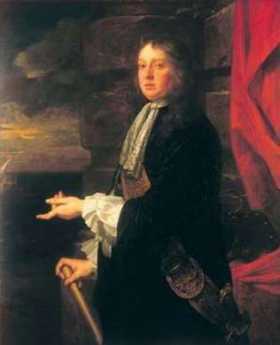
|
| William Penn |
At this point William Penn entered the picture as one of three Quaker trustees for Byllinge, who had gambling debts. A tenth of this share was given to John Fenwick, the 1675 settler of Salem, to settle his part of the disputes with Byllinge; the rest of it constituted what was to become the oldest American stockholder corporation, The Proprietors of West Jersey. The arrangement up to this point was firmly settled for the southern half of New Jersey by a Quintipartite Deed of July 12, 1676, , signed by the three Quaker trustees plus Byllinge and Fenwick. Aside from establishing the Proprietorship, the main point of this deed was the separation of West Jersey from East Jersey (the Carteret part) by a North-South line which still persists as the upper border of Burlington County. The right to govern this land was fully restored in 1680 by a Confirmatory Grant from James, probably after considerable lobbying in London by William Penn.
Presumably in pursuit of this final confirmation, Penn had negotiated a hundred-page agreement with prospective settlers which outlined his plans for governing, called the Concessions and Agreements of March 14, 1677, . Although its original purpose was mainly a real estate marketing tool, this landmark document seems not only to have persuaded the Duke of York but so shaped the thinking of the English colonies that many of its features are readily recognized in the American Constitution of 1787.
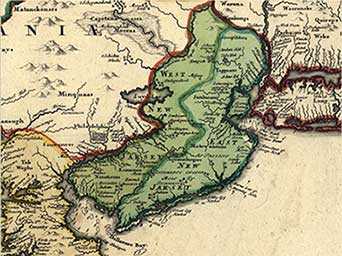
|
| The line dividing West and East NJ |
The land mass between the North and South Rivers (Hudson and Delaware) only came completely and legally into the hands of Quakers in 1681. At that time Carteret's widow, Lady Elizabeth, sold the northern half (East Jersey) to twelve Quaker proprietors, while the southern half (West Jersey) was already held by thirty-two other Quaker proprietors under the effective leadership of William Penn. It is somewhat uncertain who orchestrated this final consolidation, but there is a strong presumption that it was Penn. Since the main purpose of these business proprietorships was to sell land to immigrants, it was vital to minimize land disputes with accurate records and accurate surveying. With a history behind them of fifteen years of bickering, everybody concerned was surely ready for some peaceful organization. Both groups of proprietors, East and West, found it useful to delegate authority to a council of nine executive proprietors, whose main agent under the circumstances was logically the Surveyor General. For the next three hundred years, the surveyor generals were the men running things in New Jersey. The right of the Proprietors to govern was revoked by Queen Anne in 1702, but their land rights remain undisturbed to the present day, notwithstanding the intervening transfer of national power to the United States of America in 1776-83. Underneath all of this hustling and arranging, with exquisite attention to details, seems to be found the hand of William Penn. Almost immediately after New Jersey was packaged and delivered, King Charles paid off his family debt by turning over the far larger combined land mass of Pennsylvania and Delaware to William Penn, urging him to make himself a vassal king in the process. The Quaker instantly declined such a thing, but the power continues to reside in the final Royal Charter. It's only a conjecture, but it might help explain the strange acquaintance between a dissolute king and an abstemious Quaker to notice that the New Jersey tour de force astoundingly demonstrates how Penn was a man who really could be trusted to get complicated things done with dispatch.
Today, for practical purposes it all amounts to a company named Taylor, Wiseman, and Taylor; but we are getting a little ahead of ourselves. To go back to 1684 a surveyed line was clearly needed between the two proprietorships, as declared by the following resolution:
"Award we do hereby declare, that [the line] shall run from ye north side of ye mouth or Inlet of ye beach of little Egg Harbor north northwest and fifty minutes more westerly according to natural position and not according to ye magnet whose variation is nine degrees westward."
To clarify those quaint words, the survey was not to make the mistake made in the layout of Philadelphia, whose streets had intended to be true north and south but by using Magnetic North are actually twelve degrees off from that. Another important point is probably unclear to modern readers, who know the town of Egg Harbor on the mainland of Barnegat Bay but are largely unaware that the "beach of Egg Harbor" was what we now call Long Beach Island, on the east side of Barnegat Bay. The southern anchor of The Line was in what we now call Beach Haven, on the north side of the inlet, although beach erosion has put the southern anchor about two miles out to sea, locating a temporary marker in Beach Haven. Hardly anyone seems to be aware of it, but reread the sentence and observe the meaning is actually quite clear. The intent of the northern end of The Line (? the Delaware Water Gap ?) is buried in the obscurity of compass markings, but comes out slightly above Trenton on the Delaware River, extending beyond the river into Pennsylvania until it reached the river again in a crook on the far side of the Delaware Water Gap. Word of mouth has it that William Penn wanted to have both sides of the river although this triangle of Pennsylvania was eventually surrendered. It seems fair to say, the line was roughly intended to run from the Beach Haven ocean inlet to the Delaware Water Gap.
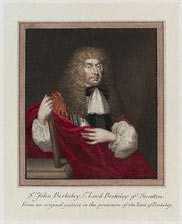
|
| John, Lord Berkeley |
For its time, the survey of The Line was also a significant engineering achievement. The general plan was to lay out the course of the line in the wilderness until it hit a big boulder or anything else that was large and heavy. This became a marker along a line of 150 markers which could be used for local surveys and boundaries. After several less accurate attempts, the West/East line was surveyed by John Lawrence in 1743 and stands as the Official Province Division Line. A few years ago, a group of volunteers tried to locate all of the original markers and found 55 of them. The historical project took ten years.
All of the deeds of property in the State of New Jersey still depend on the original survey and the meticulous notes kept by the Surveyors General of these two Quaker organizations, without whose private records every title to every property would be clouded. With the passage of time, and especially the warfare of the Revolution, other copies of the surveys have disappeared. So, without the need to get ugly about it, these soft-spoken courteous folks retain a form of power it would be hard to match with sticks and stones, guns, threats or legalisms -- the only surviving record of everyone's title to his land. There is little reason to inquire further why these Proprietorships durably survived the revolution which overthrew King George III, and why no one has seen fit to enter the serious challenge to their claim of owning the whole state except for what they had already specifically sold.
Let's go back to a point made earlier. In all the complexities of the English Royal Court and uncertainties of uncharted wilderness, how did a little band of Quakers find themselves with uncontested ownership of a whole American colony? Some of the chaos of the age probably helped. King Charles unleashed his brother's armies in 1664. Also in 1664, Parliament passed the Second Conventicle Act, which provided that not more than five persons were permitted to worship together otherwise than according to the established ritual of the Anglican Church of England. This act might be described as an improvement on the First Conventicle Act of Queen Elizabeth, which provided that no one at all could so worship. However, this prohibition was so extreme it was ignored, whereas the Second Conventicle probably had some popular support. It thus can be imagined why Quakers were suddenly interested in leaving England, and not hard to understand how young William Penn was propelled into leadership by successfully overturning that Act in the Haymarket Case. Penn was both the defendant in the case and the defense lawyer, inventing the common law principle of jury nullification that has so confounded tyranny ever since. To go on with events current at the time, the Great Plague took place in 1665, making London an undesirable place for anybody to live. And finally, George Fox, the founder of Quakerism, took a journey to the new world in 1672, noting that the place now called Burlington, New Jersey was "a bravest country". Taken altogether, it is not hard to suspect this group of fairly wealthy, fairly well-educated people developed a collective resolve to buy up the pieces, assemble the parcel, and go away to live on it. Their organization into monthly local meetings, quarterly regional meetings, and annual national meetings was surely great assistance. From what we know of the broader vision of William Penn, it is fair to speculate his enthusiasm for this communications network first suggested by George Fox, or at least he's having a pretty quick recognition how it would assist the emigration venture.
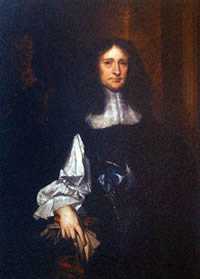
|
| George Carteret |
George Carteret's widow was the last to sell out her land parcel to the East Jersey Proprietors, presumably drawn from the 1400 immigrants who had arrived in Burlington on five or six ships between 1678 and 1681. In particular, the ship Kent sailed from the Thames in 1677, bearing 230 Quakers, half from Yorkshire, the other half from London settling further south in West Jersey. Before that, Lord Berkeley had sold his half for a thousand pounds to John Fenwick and Edward Billynge, who arrived in Salem on the ship Griffin in 1674. These two soon fell out, with Fenwick taking a tenth of the land and settling around Salem. Billynge got into unspecified difficulties, probably gambling, and turned his property over to his three main creditors, William Penn, Gawen Lawrie, and Nicholas Lucas, who assembled the Proprietorship of West Jersey. Penn's remarkable talent for leadership again emerged in his statement of "Concessions and Agreements" with the Indians and new inhabitants. In another place, we discuss the reasons for thinking this document created the effective basis of the U.S. Constitution. By infusing it with the unspoken word of compromise, Penn created the main model explaining why the ratification of the Constitution remains the only time in history when thirteen independent nations voluntarily gave up sovereignty for the purpose of creating a larger vision -- which then held together for two centuries. But the voluntary union of East and West Jersey certainly has a claim to being earlier, although its claim to sovereignty is weaker.
Perhaps so, but since their interest in power was weaker, their achievement in peaceful negotiation with a secretly Catholic King was surely much greater. If some small group of religious dissidents should today emerge as having quietly and systematically bought up an entire state, however legally, the word conspiracy would be on every tongue. In this case, however, the reaction was peaceful consensus.
Concessions and Agreements
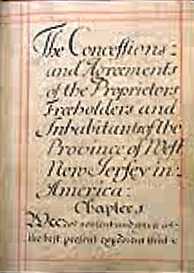
|
| Concessions and Agreements |
The United States Constitution is a unique achievement, but it had significant precursors, many of which James Madison had studied at Princeton. In the days of difficult ocean travel, almost all colonies were bound by an agreement to maintain loyalty to their European owners in spite of receiving latitude to govern themselves. Charters and documents defining these roles were generally written by the owners, and the colonists could pretty much take them or leave them. In the case of New Jersey in 1664, however, a very formidable lawyer and friend of the King named William Penn was drawing up agreements to his own conditions of sale, taking care that the grant of governing authority he received was favorable. Penn's relationship to the King was unusually good, to say the least. He had more reason to be wary of nit-pickers in the King's administration, trying to anticipate every conceivable disappointment for some successor King.
For his part, Penn wanted to make colonial land attractive to re-sell to religious groups who had experienced harsh government oppression; he wanted no obstacles to his announcing there would be no religious oppression in New Jersey. He was offered the role of sub-king although he hastily rejected any such title, and needed to repeat the formalities of the Charter to define his role and reassure his settlers about that matter. Furthermore, he was dealing with the heirs of Carteret and Berkeley, active participants in North and South Carolina. So Penn's method of achieving basic rights was influenced by prior thinking in the Carolinas, as the thinking of John Locke secondarily influenced matters in Delaware and Pennsylvania. These ideas were incorporated in a New Jersey document called "Concessions and Agreements." The concepts were not wholly the ideas of William Penn, but he did write it, and it does contain many ideas that were uniquely his. Understandings about limits were set down, argued about, and agreed to. The owner risked money, the colonist risked his life. Neither would agree unless a reasonable bargain was struck in advance of any dispute. Furthermore, the main value of a colony was beginning to shift from trading rights to real estate rights. Carteret and Berkeley had not only been principals in both the Carolinas and the Jerseys but had been involved in a number of such investments in Africa and the West Indies; New Jersey was just another business deal. It was conventional for documents of this type to define the method of selection of a governor, the establishment of an assembly of colonists, and some sort of council to attend to day to day affairs. In that era, few colonists would cross the ocean without a guarantee of religious freedom, at least for their own brand of religion. Standard clauses which may sound strange in today's real estate world, were then necessary because it was a transfer of not merely land, but also the terms of government. In the case of the Quaker colonies, many of these stipulations were included in the earlier charter from the King. It seems very likely that Penn hovered around and negotiated these points which he wished to have the King agree to; and then once the land was safely his, Penn repeated and expanded these stipulations with the colonists in his Concessions and Agreements . It wasn't exactly a Constitution, but it reads a lot like the one America adopted a century later.
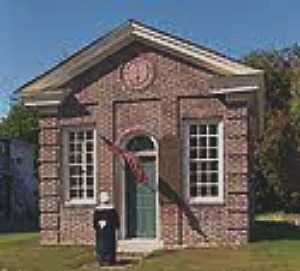
|
| Proprietors House |
Quakers had suffered persecution and imprisonment, and knew exactly what they feared; on the other side, it seems likely Carteret and Berkeley were less interested. So this real estate transfer document conceded almost anything the colonists wanted and the King would stand for, couched in conciliatory phrases. For example, no settler was to be molested for his conscience, and liberty was to be for all time, and for all men and Christians. Elections, by the way, must be annual, and by secret ballot. While law and order must prevail, nevertheless no man is to be imprisoned or molested except by the agreement of twelve men of the neighborhood. On the matter of slavery, no man was to be brought to the colony in bondage, save by his own consent (that is, indentured servants were to be permitted). And in what proved to be a final irony for William Penn, there was to be no imprisonment for debt. Almost all of these innovative ideas survived into the U.S. Constitution a century later, but the most innovative idea of all was to set them all down in a freely-made agreement in writing. This was not merely how a government was organized, it defined the set of conditions under which both sides agreed it would operate.
It was, of course, more than that. It was a set of reassurances to settlers who had been in New Jersey before the English arrived that they, also, would be treated as equals. It was a real estate advertisement to the fearful religious dissenters back in England that it was safe to live here. And it was a reminder to future Kings and Parliaments that this is what they had promised.
The pity and a warning, is that the larger vision of a whole continent governed fairly by common consent may have been too grandiose for a little band of New Jersey Quakers, surrounded as they were by an uncomprehending world. All utopias are helpless when stronger neighbors reject the basic premise. However, it was the expansion of the pacifist concept to the much larger neighboring territory of Pennsylvania that proved to be just too much for such a small group of friends to manage by consensus, particularly when unbelieving immigrants began to outnumber them. But the essential parts of it certainly remained in the minds of delegates to the Constitutional Convention in 1787. When the minutes of the Constitutional Convention speak of the "New Jersey Plan", the Concessions and Agreements was what they had in mind.
REFERENCES
| Concessions and Agreements of New Jersey 1676: William Penn | New Jersey State Library |
| Camden After the Fall: Decline and Renewal in a Post-Industrial City: Howard Gillette Jr.: ISBN-13: 978-0812219685 | Amazon |
WILLIAM BLATHWAYT'S DRAFT OF THE CHARTER OF PENNSYLVANIA
Charles the Second, by the grace of [God] King of England, Scotland, France, and Ireland, Defend[er] of the Faith & Co. To all to whom these presents shall come, greeting.
Whereas our truste[d] and well beloved subject William Penn Esquire, sonne and heire of Sir William Penn, deceased, out of a comendable desire to enlarge our English Empire and promote such usefull comodities as may be of benefit to us and our dominions, as also to reduce the Savage Natives by Gentle and just manners to the Love of civill Society and Christian Religion, hath humbly besought leave of us to transport an ample Colony unto a certaine Country hereinafter described in the parte of America not yet cultivated and planted. And hath likewise humbly besought our Royall Ma[jes]tie to give, grant, and confirme all the said Country with certaine priviledges and Jurisdicions requisite for the good government and safety of the said Country and Colony, to him and his heires for ever. Know yee therefore that wee, favoring the petition and good purpose of the said William Penn, and haveing regard to the memory and merits of his late Father in diverse services and particularly to his conduct, courage, and dircctione {discretion} under our dearest Brother James, Duke of Yorke, in that signall Battle and Victorie fought and obtained against the Dutch Fleet comanded by [illegible word deleted] {The}2 Heer Van Obdam in the yeare 1653. In consideration thereof of our speciall grace, certaine knowledge, and meere motion have given and granted and by this our present Charter for us our heires and successors, doe give and grant unto the said William Penn his heires and Assignes
All that Tract or part of Land of {in}4 America with all the Islands therein contained as the same is bounded on the East by Delaware River from Twelve miles distance Northwards of Newcastle Towne unto the Three and Fortieth degree of Northerne Latitude, If the said River doth extend soe farr northwards. But if the said River shall not extend soe farr northward. then by the said River soe farr as it doth extend, and from the Head of the said River, the Eastern-bounds are to be determined by a Meridian Line to bee drawne from the head of the said River unto the said Three and Fortieth degree; The said Lands {to} extend westward Five degrees in longitude to be computed from the said Eastern bounds, and the said Lands to be bounded on the north by the begining of the Three and Fortieth degree of northerne Latitude and on the South by a Circle drawne of {at}5 12 miles distance from Newcastle northwards6 and westwards, unto the begining of the Fortieth degree of northerne Latitude, and then by a streight line westwards to the limit of Longitude above mentioned7
Wee doe alsoe give and grant unto the said William Penn his heires and Assignes The free and undisturbed use and continuance in and passage into and out of all and singular Ports, Harbours, Bayes, Waters, Rivers, Isles and Inletts belonging unto and {or} leading to and from the Country or Islands aforesaid And all the Soyle, Lands, Feilds, woods, underwoods, mountaines, hills, Fenns, Isles , Lakes, Rivers, Waters, Rivuletts, Bayes, and Inletts scituate or being within or belonging unto the Limitts and bounds aforesaid together with the fishing of all sorts of Fish, whales {sturgeons} and all Royall and other Fishes in the Sea, Bayes, Inletts, waters, or Rivers within the premisses and the Fish therein taken And alsoe all veines Mines and Quarries as well discovered, as not discovered, of gold, silver ,gemms and other {pretious} stones and all other whatsoever bee it of stones, mettalls, or of any other thing or matter whatsoever found or to be found within the Country Isles or limitts aforesaid
And him the said
In Witnesse whereof We have caused these Our Letters to be made Patents, Witness Ourselfe at Westm1 the 4th day of March, In the three and Thirtieth yeare of Our Reigne, 1680/180 Pigott81
Note: Footnotes, edits and insertions from Richard P. Dunn and Mary Maples Dunn, "The Papers of William Penn", U. of PA Press, 1982
Clarifying punctuation and emphasis by George Ross Fisher
The Naming of Pennsylvania
On January 5, 1681, William Penn wrote a letter to his friend Robert Turner:
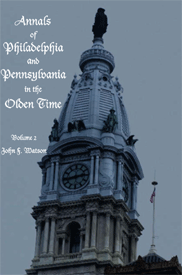
|
| Annals of Pennsylvania |
"This day my country was confirmed to me by the name of Pennsylvania, a name the King would give it, in honor of my father. I chose New Wales, being, as this, a pretty hilly country; but Penn, being Welsh for a head -- as Pennanmoire in Wales, and Penrith in Cumberland, and Penn in Buckinghamshire, the highest land in England, -- they called this Pennsylvania, which is the high or head woodlands, for I proposed (when the Secretary, a Welshman, refused to have it called New Wales), Sylvania, and they added Penn to it; and though I much opposed it and went to the King to have it struck out and altered, he said, 'twas past, and would take it upon him; nor would twenty Guineas move the under Secretaries to vary the name, -- for I feared lest it should be looked on as a vanity in me, and not as a respect in the king, as it truly was, to my father, whom he often mentions with praise."
John F. Watson, the author of what generations have called "Watson's Annuals," goes on to comment:
"If the cause was thus peculiar in its origin, it is not less remarkable in its effect, it being at this day perhaps the only government in existence which possesses the name of its founder."
Watson further makes the footnote: "Penn himself professed to have descended of the house of Tudor, in Wales, one of whom, dwelling on an eminence in Wales, received the name of John Pennunnith. He going afterward to reside in London, took the name of John Penn, i.e. John on the Hill."
William Penn: Visionary with Persuasiveness
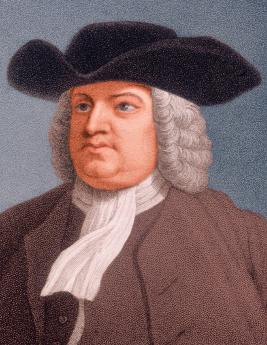
|
| William Penn |
It was a signal and blessed providence which first induced so rare a genius, so excellent and qualified a man as Penn, to obtain and settle such a great tract as Pennsylvania, say 40,000 square miles, as his proper domains. It was a bold conception; and the courage was strong which led him to propose such a grant to himself, in lieu of payments due to his father. He besides manifested the energy and influence of his character in court negotiations, although so unlikely to be a successful courtier by his profession as a Friend, in that he succeeded to attain the grant even against the will and influence of the Duke of York himself who, as he owned New York, desired also to possess the region of Pennsylvania as the right and appendage of his province.
"This memorable event in history, this momentous concern to us, the founding of Pennsylvania, was confirmed to William Penn the Great Seal on the 5th of January, 1681."
-John F. Watson,
Annals of Philadelphia and Pennsylvania in the Olden Time
Unalienable Rights Before 1776
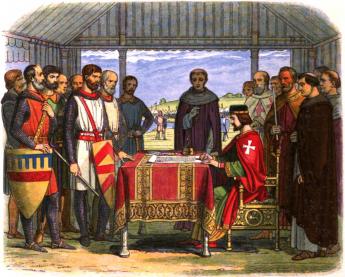
|
| Magna Carta |
In 1976, the bicentennial birthday celebration of the Declaration of Independence contained two major exhibits of its conceptual origins. Mr. H. Ross Perot of Texas loaned his copy of the 1215 Magna Carta, and the Proprietors of West Jersey loaned their 1677 original of William Penn's Concessions and Agreements to the colonists of New Jersey. The purpose of the exhibit was to emphasize the historical origins of the concepts within the Declaration, but even the language of the Concessions is remarkably similar, quite evidently lifted by Jefferson when he was writing. On one point, Penn had the better of Jefferson; he correctly wrote about inalienable rights, while somehow Jefferson gave us unalienable ones.
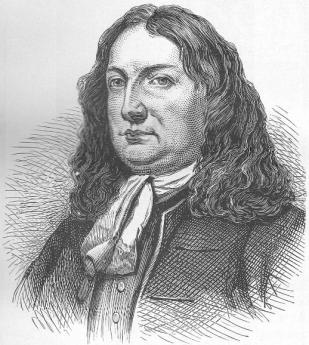
|
| William Penn |
The matter came up recently at a Socrates meeting of the Right Angle Club, where at least one member felt there was no such thing as a natural right, while others wavered. In discussing the rights which the Creator, William Penn and/or Thomas Jefferson may have given us, the various contexts must be held in mind. At the time of declaring our intention to sever relations with Britain's King, there was no Constitution to refer to as a source, and it was impolitic to assert the rights had been given by English kings, like King John. Therefore, the language cleverly short-cuts around the divine right of kings to make a direct connection between the Creator and the colonists. William Penn on the other hand, was a real estate promoter, offering enticements and assurances to prospective colonists who were naturally fearful of risking their lives in sailboats, only to face the possible tyranny of a vassal king who might be even worse than the anointed one. Not only did Penn renounce any suggestion of a Royal role for himself, but went to considerable length describing the legally binding concessions and agreements he was offering. The right of trial by jury, for example, became a right to be punished only by a jury of twelve of one's neighbors. He wasn't talking to lawyers, he was making important distinctions very clear to laymen. These were not rights given by a Divinity who could be trusted, nor something which grew out of Mother Nature. They were the personal promises of William Penn, in personal legal jeopardy of the English courts if he reneged on them. He even had a ready answer for those who discovered the religious language in legal documents -- the Quaker belief that, occasional appearances to the contrary notwithstanding, There is That of God, in every man.
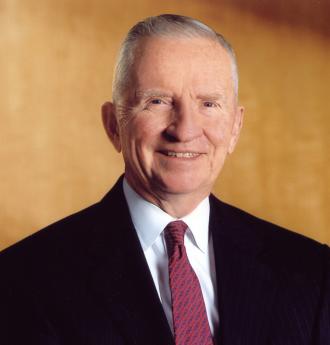
|
| H. Ross Perot |
As a small sidelight of the Concessions document, it had long been housed in the little brick hut on Main Street in Burlington NJ, where the Proprietors of West Jersey keep their treasures. The obscurity of these papers was probably their best protection, but the risk of displaying them in Philadelphia at the centennial brought out the need to ensure them, hence to appraise their value. The figure of four million dollars was kicked around. Ross Perot might have felt comfortable with this sort of expense as the natural cost of being a rare book collector, but it seemed highly unnatural to Quakers. Sometime afterward, the Surveyor General, William Taylor, was awakened by a call from Burlington neighbors that someone was trying to break in the roof to steal contents of the Proprietorship building. The burglars were unaware that underneath the shingles, the roof was actually made of concrete a foot thick. So the perps were frustrated in their aims, but Bill Taylor was greatly troubled by the implications, actually unable to sleep at night worrying about what was in his custody. So, in time the State of New Jersey constructed a suitable archives building, and the valuable documents were transferred up to Trenton. Time will tell what the Soprano State does with such a valuable possession, but at least the Quakers can now sleep at night.
Germantown Before 1730
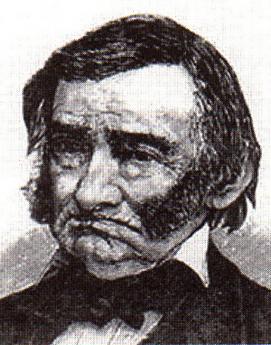
|
| Rev. Wilhelm Rittenhausen |
The flood of German immigrants into Philadelphia after 1730 soon made Germantown, into a German town, indeed. From 1683 to 1730, however, Germantown had been settled by Dutch and Swiss Mennonites, attracted by the many similarities between themselves and the Quakers of England. They spoke German dialects to preserve their separateness from the English-speaking majority but belonged to distinctive cultures which were in fact more than a little anti-German. This curiosity becomes easier to understand in the context of the mountainous Swiss burned at the stake by their Bavarian neighbors, Rhinelanders who sheltered them from various warring neighbors, and Dutchmen at the mouth of the Rhine, all adherents of Menno Simon the Dutch Anabaptist, but harboring many differences of viewpoint about the tribes which surrounded them.
Anabaptism is the doctrine that a child is too young to understand religion, and must be re-baptized later when his testimony will be more binding. In retrospect, it seems strange that such a view could provoke such antagonism. These earlier refugees were often townspeople of the artisan and business class, rapidly establishing Germantown as the intellectual capital of Germans throughout America. This eminence was promoted further through the establishment by the Rittenhouse family (Rittinghuysen, Rittenhausen) of the first paper mill in America. Rittenhousetown is a little collection of houses still readily seen on the north side of the Wissahickon Creek, with Wissahickon Avenue nestled behind it. The road which now runs along the Wissahickon is so narrow and windy, and the traffic goes at such dangerous pace, that many people who travel it daily have never paid adequate attention to the Rittenhousetown museum area. It's well worth a visit, although the entrance is hard to find (try going west on Wissahickon Avenue then turning around, a little beyond the entrance).
Even today, printing businesses usually locate near their source of paper to reduce transportation costs. North Carolina is the present pulp paper source, several decades ago it was Michigan. In the Seventeenth and Eighteenth centuries, paper came from Germantown, so the printing and publishing industry centered here, too. When Pastorius was describing the new German settlement to prospective immigrants, he said, "Es ist nur Wald" -- it's just a forest. A forest near a source of abundant water. Some of the surly remarks of Benjamin Franklin about German immigrants may have grown out of his competition with Christoper Sower (Saur), the largest printer in America, and located of course in Germantown.
Francis Daniel Pastorius was sort of a local European flack for William Penn. He assembled in the Rhineland town of Krefeld a group of Dutch Quaker investors called the Frankford Company. When the time came for the group to emigrate, however, Pastorius alone actually crossed the ocean; so he was obliged to return the 16,000 acres of Germantown, Roxborough and Chestnut Hill he had been ceded. Another group, half Dutch and half Swiss, came from Krisheim (Cresheim) to a 6000-acre land grant in the high ground between the Schuylkill and the Delaware. The time was 1683. The heavily Swiss origins of these original settlers give an additional flavor to the term "Pennsylvania Dutch".
Where the Wissahickon crosses Germantown Avenue, a group of Rosicrucian hermits created a settlement, one of considerable musical and literary attainment. The leader was John Kelpius, and upon his death the group broke up, many going further west to the cloister at Ephrata. From 1683 to 1730 Germantown was small wooden houses and muddy roads, but there was nevertheless to be found the center of Germanic intellectual and religious ferment. Several protestant denominations have their founding mother church on Germantown Avenue, Sower spread bibles and prayer books up and down the Appalachians, and even the hermits put a defining Germantown stamp on the sects which were to arrive after 1730. The hermits apparently invented the hex signs, which were carried westward by a later, more agrarian, German peasant immigration, passing through on the way to the deep topsoil of Lancaster County.
William Penn Conducts a Witchcraft Trial
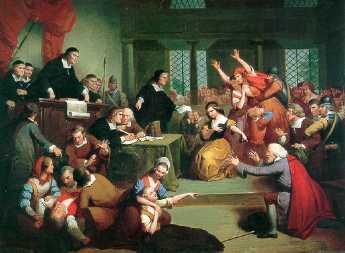
|
| Salem Witch Trials |
When trials for witchcraft are mentioned, most people think of Salem, Massachusetts, where 19 people were hanged as witches and hundreds were imprisoned, in 1692. The Salem trials were apparently provoked by a minister from Barbados, and it is thought the uproar about witches in America was in part related to encountering the spiritualism of the Indian tribes. Whatever its origins, the issue has been in the background for a long time, and occasionally even surfaces today in accusations of "Satanic rituals."
There were trials for witchcraft in New York in 1664, in West Chester in 1672, and in Princess Ann county of Virginia. But the trial of central interest to Pennsylvania occurred in 1683, when Governor Penn presided over it, himself. Pennsylvania had adopted British laws, including one from James I concerning the crime of witchcraft, so Penn probably had little choice but to hold the trial. His fellow judges were his Council; there is little doubt the outcome reflects his opinion.
The accused were two Swedish women, Margaret Mattson and Yeshro Hendrickson, who pleaded not guilty. Numerous witnesses told vague stories, and Mattson's daughter expressed her conviction of her mother being a witch. Governor Penn finally charged the jury, which brought in a memorable verdict. The defendants were found guilty of "having the common fame of a witch" but not guilty in the manner and form.
There are times, and this was one of them, when it is not useful to be overly precise in your meaning.
Bristol, PA
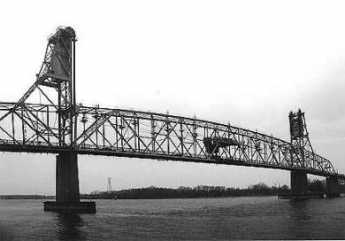
|
| Burlington Bristol Bridge |
In 1681, Samuel Clift activated a local land conveyance, written to go into effect as soon as King Charles II signed the overall land grant to William Penn. In this way, Bristol claims to be the oldest settlement in English Pennsylvania; Clift got here before Penn did. He chose the narrowest spot in the river as an excellent place to run a ferry which was only replaced by the Burlington Bristol Bridge in 1930. A ferry landing is an excellent place for an Inn, which he also built there. The town he founded was called Buckingham, and the surrounding county became Buckinghamshire, Bucks for short. The name later changed to Bristol. The New Jersey town on the other end of the ferry ride was called Bridlington, later Burlington. North of this narrow spot in the river was a several-mile extent of marsh and swampy inlets, and then the river turns abruptly northwest at what used to be called the falls at Trenton.
William Penn had considered building his house sixty miles south of there at the Southern end of Philadelphia Bay, at Chester, then pondered building it on the Faire Mount where the Philadelphia Art Museum now overlooks the Schuylkill. In the end, he built a Philadelphia house near Dock Creek (subsequently covered over and renamed Dock Street) and a palatial manor house, Pennsbury, in the swampy marshes above Bristol, where a tourist visit is now a valuable experience.
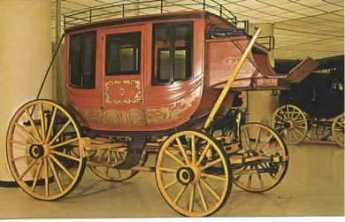
|
| Stagecoach |
No doubt being near the Proprietor's estate gave Bristol some class, but it was also half-way on a two-day stagecoach ride from Philadelphia to New York. A succession of inns and resorts grew up in Bristol, and it became a busy transshipment place, a good place to build schooners. A local Captain John Cleve Green is celebrated as first to carry the American flag to China, although it must be admitted his cargo included opium; Green is regarded as the financial founder of the nearby Lawrenceville School. The terminus of the Delaware canal brought coal from the anthracite region in 1827; more prosperity ensued as coal was loaded on ships in Delaware, or utilized instead of water power for the Bristol Mills which had been founded by Samuel Carpenter in 1701. John Fitch invented the first steamboat and tried it out here; more prosperity ensued, although not for poor Fitch, who committed suicide. Little Bristol gradually filled up with imposing waterfront mansions, the declining shells of which can still be admired.
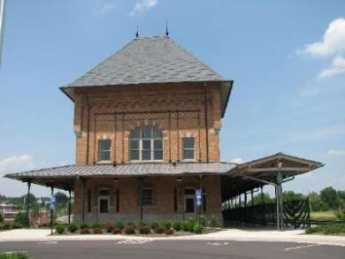
|
| Bristol Railroad |
The advent of the railroad isolated Bristol when it cut off the corner of the bend in the Delaware River. Four-lane highways eventually consolidated the isolation of the little river town, but the turning point was around the time of the Civil War. For nearly a century, between the Revolution and the Civil War, Bristol was the booming little queen of northern Philadelphia Bay, and the Bay itself was an American Lake Como, lined with Federalist and Victorian mansions, their lawns sweeping down to the water's edge. Small wonder there was so much social interaction between the railroad-isolated Bristol, and planters of Chesapeake Bay. The strip of quiet charm begins at Pennsbury Manor and pretty continuously extends to Bristol, where you can go under the rail embankment and on to Philadelphia, or alternatively cross the Burlington Bristol Bridge to New Jersey. A couple of miles further south, the river edge is a little ragged but includes some yacht clubs and several famous mansions, notably Nicholas Biddle's Andalusia, the Foerderer family's Glen Ford, and the former mansion of Saint Katherine Drexel.
The Bristol area has had moments of fame. George Washington had originally planned to attack Trenton from both the north and the south simultaneously. He came over what is now called Washington's Crossing amid the ice floes on the north side of the Pennsbury delta, and General Cadwalader was to cross Delaware at Bristol, on the south side of the marshes. As it turned out, the ice was worse at Bristol and the river wider, so Cadwalader was late for Trenton but caught up with Washington to help with the battle at Princeton. President Tyler's daughter married a dashing gentleman from Bristol. Republican politicians from Bristol teamed up with some others in West Chester to decide that favorite-son Seward couldn't win, so they backed Abraham Lincoln for the presidential nomination, and Pennsylvania was therefore in time richly rewarded for its political acumen. Despite the arts and crafts group that moved in around New Hope PA, Bucks County has remained a Republican stronghold ever since. The region's influence was long symbolized by Joseph P. Grundy, the gentle Quaker manufacturer from Bristol whose name struck terror in Republican politicians as well as Democrat ones, but for opposite reasons.
The Burlington Bristol Bridge is now getting a little narrow and ancient, but is still serviceable. It long charged only a dime's toll because that was enough for painting and upkeep. Together with the Tacony Palmyra Bridge, which charged the same low toll, these locally owned bridges stuck a thumb in the eye of the tax-and-spend folks who owned the Philadelphia bridges and who wanted to charge three dollars toll, spending most of it on non-bridge activities. As Tacony Palmyra Bridge rests on both sides of the river, the local politics gradually shifted enough to permit a restoration of toll "equity".
Pennyslvania's Boundary: David Rittenhouse, Hero, Lord Baltimore, Villain
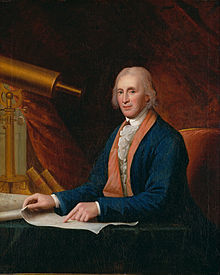
|
| David Rittenhouse |
In the Twenty-first Century, when we know how every American creek and river run, we can see it might have been simple to establish a boundary between the new royal grant to William Penn, and an earlier grant to Lord Baltimore by the then-reigning king's father, Charles I. Essentially: Penn got the Delaware Bay and a lot of wilderness to the west of it. George Calvert, Lord Baltimore, had long held the top half of the Chesapeake Bay and a strip of wilderness to the west of that. Two bays, with two hazy strips of wilderness attached.
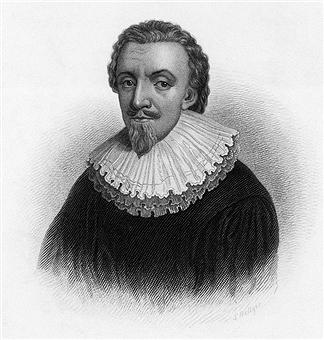
|
| George Calvert, Lord Baltimore |
At what is now Odessa, Delaware, those two bays are only five miles apart; compromise should have settled the issue quickly. Two English gentlemen could have sat down over a pipe and a brew, working something out. However, the English nation was then changing kings, beheading them over matters of religion. A Roman Catholic, Lord Baltimore probably thought an opportunity might emerge from the turmoil if he stalled until matters went his way, since next in line of succession was James, Duke of York, who was a Catholic. But matters fall into the hands of the lawyers when principals of an argument are unable to speak. As we noted elsewhere, in the legal system of the day the last word from the last king was what counted in law courts, accepting any uncertainty about future latest words from future latest kings in order to maintain immediate peace. To lawyers of the time, all this talk about justice, fairness, and geometry was idleness when the nation needed order and stability. So the Calvert family lawyers over the course of eighty years, introduced one specious proposition after another that turned other lawyers purple with rage. Penn's lawyer, Benjamin Chew, beat them at this game, and his mansions in Delaware and Germantown attest to the value attached to this achievement. In other circumstances, posturing might have led to war, as it did in similar disputes with Connecticut. Penn probably knew better, but it takes two to compromise.
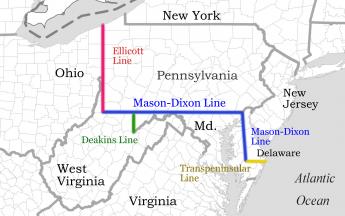
|
| Mason-Dixon Line |
It must be admitted that honest confusion was possible. Sometimes, a line of latitude was a line in the sense Euclid intended: all length and no width. At other times, lawyers and kings were talking about "parallels" as if they were strips, roughly sixty miles wide. If a sixty-mile strip was intended, it was important for a grant to specify whether it extended to the southern edge of the strip, or to the northern edge. But in fact, the state of science in the Seventeenth Century contained uncertainty about both where the strips were, and how wide. And if the grant's language didn't even make it clear whether the parties were talking about strips or width-less lines, eighty years could be a comparatively short time for a court to decide the case. To be fair to Lord Baltimore, many people at the time didn't think these matters were capable of fair solution, so the traditional way of dealing with land disputes was either by force or by craftiness.
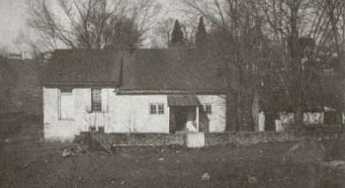
|
| David Rittenhouse Birth Place |
In William Penn the folks from Maryland were, unfortunately, dealing with a friend of the King, who had one of the most brilliant mathematicians in Western civilization as his adviser. David Rittenhouse may have been born in that little farmhouse you can still visit on the Wissahickon Creek, and made his living as a clockmaker, but his native talents in mathematics, astronomy surveying, and instrument construction were so deep and so varied that later biographers are reduced to describing him merely as a "scientist" and letting it go at that. If you want to sample his talents, spend an hour or two learning what a vernier is, and then see if you could apply that insight, as he did, to a compass. So, as it turned out, Rittenhouse was able to describe a twelve-mile circle around New Castle, Delaware, construct a tangent that divides the Delmarva's Peninsula in half, and match it up with an east-west line we now call the Mason Dixon Line. When they finally got around to laying these lines on the ground, Mason and Dixon cut a twenty-four-foot swath through the forest, using astronomical adjustments every night, and laying carved marker stones every fifth of a mile for hundreds of miles. The variation from the line devised by Rittenhouse was at most a fifth of a mile off the mark; the intersection with the north-south line between Maryland and Delaware was less successful. The survey by Mason and Dixon was not quite completed to the Ohio line because the Indians, curious at first, eventually became wild with suspicion at such behavior, particularly the part about going out and aiming cannons at the sky every night. It seems likely that George Calvert, Lord Baltimore, had no more confidence in this madness than the Indians did.
So, the next time you take the train from Philadelphia to Washington DC, reflect that strict reading of the words in the land grants did admit the possibility that your whole trip could either have been within the State of Maryland, or else in the Commonwealth of Pennsylvania, depending on whether lawyers, or scientists, had triumphed in this dispute. Since the Mason Dixon Line later divided not merely two states, but two violently opposed cultures, Rittenhouse must stand out in the history of one of those people who were so smart that most people couldn't understand how smart he was.
Forming the State of Delaware
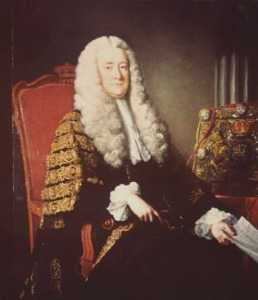
|
| Philip Yorke, Earl of Hardwicke |
When the Duke of York was within hours of being banished, he told his agent Sir John Werden to give the contested strip (now the state of Delaware) to Penn, but save out the town of Newcastle with a twelve-mile strip of land around it. Werden wrote that into the charter with a proviso based on the idea that the fortieth parallel was to the south of Newcastle, when in fact it was fifty miles north of it, and could not possibly conform to the stated boundaries. Both Penn and Baltimore learned the true situation in a year or two, and both attacked the other for dissembling ignorance, each seeking to take advantage of implausible arguments. What in fact they both discovered was that if the dividing line could be pushed a few miles south, Penn would acquire the mouth of the Susquehanna in the Chesapeake Bay, while if it went north a few miles, Maryland would acquire most of Philadelphia. Lord Hardwicke worked out a reasonable compromise which, while ignoring some plain language in the documents, eventually resulted in the Mason-Dixon line which is now reasonably comfortable for everybody, although first subjected to another two decades of wrangle.
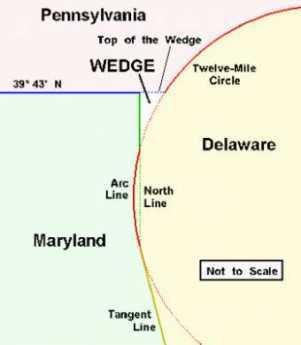
|
| Delaware Wedge |
Even part of the eventual compromise, a semicircular northern border, didn't come out right, resulting in a wedge of no-man's land. Landowners didn't enjoy paying disputed taxes, so they held up the settlement of the wrangle into the Twentieth Century. Eventually, the U.S. Supreme Court cut the wedge into two pieces, giving one piece each to Pennsylvania and Delaware. Meanwhile, disputes continued which had their basis in the way the semi-circular line was plotted out on the land. The surveyors ran 120 straight-line radii outward from the courthouse tower in Newcastle, and then connected the ends. Obviously, that resulted in 120 straight chords instead of a smooth semi-circle, and a couple of bulges had to be accommodated where the circle grazed other straight borders. The semi-circle crossed the Delaware River, so New Jersey helpfully abandoned its portion, only to regret its decision later when toll bridges were constructed, and ship channels deepened.

|
| King Charles I |
Two major societal changes took place between 1632 -- when Charles I granted the proprietorship of Maryland to the first Lord Baltimore -- and 1776 when all American real estate changed its rules. The first change was that the Delaware Bay morphed from a swamp into settlements of people; settlers came into possession. The second evolution was to the current view that if you sell some real estate it is no longer yours; in earlier eras, everything belonged to the king, who could take it away and give it to others as often as he pleased. In legal terms, the last king had the last word. Although acres of parchment were scribbled by lawyers pro and con, these considerations are what make clear how Lord Baltimore could hold the unchallenged legal title for fifty years to everything up to the fortieth parallel, but then have a court take away thousands of square miles. A land which was to become the three lower counties of Pennsylvania was given to William Penn by the Duke of York in 1682, using some flawed documents and only fully enjoyed by Penn's heirs for six years until they morphed into the new State of Delaware. From 1684 to 1769, legal ownership was a matter of continuing dispute. The exasperated Lord Chancellor (Hardwicke) in 1750 declared the case as one "of nature worthy of the judicature of a Roman senate rather than of a single judge".
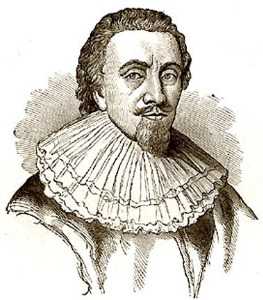
|
| Lord Baltimore |
Lord Baltimore had been given "unsettled" land, occupied only by savages. William Penn's lawyers struggled to prove the Dutch had settled the area before 1632, while Baltimore's lawyers sought to prove that pirates and wandering fur traders don't count, nor do villages of thirty people who were wiped out by the Indians. By the Doctrine of Discovery, taking land from pagans was encouraged, but taking land from Christians required special formalities. Since this Doctrine dates back before there were Protestants, it might have been pertinent to inquire whether the Dutch should be regarded as pagans, as the Spanish surely did when they suppressed Dutch independence in the Eighty Years War, ending in 1648.
Lord Baltimore advertised land along Delaware for sale to settlers while the matter was still under litigation. That was the foulest play said Penn, a weak argument to make if litigation was intentionally pursued for a century.
Maryland favored the Catholic cause, so it seemed plausible for them to want to stall, hoping the Catholic Duke of York would ascend to the throne. Under the new King James II, however, Baltimore seemed unlikely to prevail that the same person, as Duke of York, really didn't own the land he was trying to give to William Penn. So of course, Lord Baltimore claimed he never stalled.
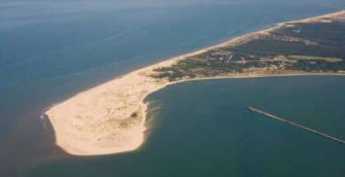
|
| Cape Henlopen |
And by the way, ocean currents moved Cape Henlopen a mile or so southward, but the real boundary problem was that common usage over the centuries confused Cape Henlopen with Fenwick's Island (to which it is usually attached by a thin barrier island), making an implicit difference in the Maryland/Delaware ownership of the corresponding strip of land at the southern border of the State of Delaware, a matter of a hundred or so square miles.
And all of this confusion was merely about the borders of one of the smallest of our fifty states. The political manner in which Delaware became a colony without a charter to the King, and became a state by gradual and mystifying degrees separate from the other counties of Pennsylvania are other complicated stories. Never mind the reasons Delaware remained in the Union during the Civil War, even though it also remained a slave state.
With gratitude to the memory of Dudley Cammett Lunt 1896-1981, whose books are a most readable but scholarly analysis of this complicated history. In particular, The Bounds of Delaware and, for the Mason-Dixon Line, Taylor's Gut in the Delaware State are recommended. The courts rejected arguments that the land was essentially wilderness when Lord Baltimore acquired his patent, and history has been sympathetic to Penn, the winner. The contention was the Dutch owned the land by right of discovery ( a Doctrine applied to land ruled by pagans by Pope Nicholas II in 1454), while the Duke of York later took it from the Dutch by surrender to force of arms -- another legally benign method of acquiring sovereignty. However, Lunt points out that a far more significant issue was the southern border of Pennsylvania in Penn's original grant, which asserted geographical impossibility to replace Maryland's plain and simply defined boundary. History has tended to regard this as understandable error, and subsequent legal quarrels to have been perpetuated by William Penn's greedy heirs. However, Lunt seems to reveal his own opinion of the affair by ending his book with a July 31, 1683 quotation from a letter by William Penn to Colonel Thomas Tailleur:
I, finding this place necessary to my Province and it ye Presence of Ld. Balt. was at Law, civil & common, I endeavoured to get it, & have it, & will keep it if I can.
The Proprietorships of William Penn
William Penn became first interested in the Colonies when he acquired New Jersey as an investor in what started out as the bankruptcy proceedings of a client. Unlike his spoiled children and grandchildren, he was sincerely interested in helping the persecuted members of his new religion, and those who later totaled up his lifetime finances found that overall he lost money on his real estate ventures. His descendants, however, were mainly concerned with selling real estate, and soon reverted to Anglican church membership. When William Penn later received Pennsylvania and Delaware from the King of England (Charles II, the Stuart King restored with the help of his Admiral father), he not only owned these territories but for practical administrative reasons was offered the right to rule them. By then Penn's main future intention was to found a refuge for Quakers and other religious dissenters, so becoming a vassal King was graciously declined. Instead, he became a real estate Proprietor, after satisfying himself about the government and other arrangements in only a general way. At least half the original 13 colonies were also proprietorships, although the terms of their grants had great variation. Penn's intention for the proprietorship was to sell off as much of the property as possible, sort of benignly watching the process unfold in the parts he had sold.
There were two unforeseen flaws in this benevolent idea; the first was that his sons and heirs would abandon the Quaker faith and have little interest in his holy experiment except for the revenue it returned. The second flaw was to fail to see that vigorous religious toleration might eventually lead to the Quakers becoming outnumbered in their own refuge. Eventually, there does come a time in the real estate sell-off process when you have sold more than you retain. After that point, you may no longer dominate the politics, and in fact, that happened far sooner than half-way, because of Penn's unwillingness to employ force .

|
| William Penn |
In land value, although perhaps not in land area, that point of loss of control had been reached by the middle of the eighteenth century, and it led to a famous battle between the Penn descendants and Benjamin Franklin. The Penn family saw no justice in paying taxes on the land they hadn't yet sold, or obeying laws created by their customers which extended beyond the land they owned; if they wanted to rule it all, they should buy it all. Franklin took the part of the settlers and immigrants, who resented paying taxes and fighting Indians on behalf of someone who still owned vast stretches of the land "within" the colony. A significant factor in this peculiar argument is that Thomas Penn, the dominant chief of the family descendants, had a deep and abiding suspicion of Franklin, dating back to that episode related in Franklin's Autobiography where Franklin raised a militia in King George's War when the pacifist Quakers refused to do so. Both sides had some justice in their positions, both sides appealed to the King. The Penns knew the King better, so Franklin lost. That was mostly what Franklin was doing in London in the years before the Revolution, and eventually, it took a Revolutionary war to resolve the issue. Some have said the episode showed Franklin was not as shrewd a politician as history books would portray him. In fact, it more likely emphasizes that Franklin was a loyal British subject right up to 1775. His position was that all parties were and forever would be, inhabitants of the British Empire, so they had equality under British rule. The Penns felt they had a right to consider Pennsylvania their own sovereign property, under which the colonists had no rights until they paid for them. It is easy to see how the notion of independence could take hold in this curious reversal of roles. Nevertheless, Pennsylvania did resolve the issue with the appearance of lawfulness, although with restrained generosity. To quote Sydney G. Fisher, writing in The Quaker Colonies, "When the people could have confiscated everything in Pennsylvania belonging to the proprietary family, they not only left them in possession of a large part of their land but paid them handsomely for the part that was taken." The matter is generally considered to have been finally settled by the Confirming Act of 1787, although few would now contend that fifteen pennies per acre is or was a handsome price.
And so, the Pennsylvania proprietorship was dissolved. In New Jersey, on the other hand, the proprietorship still exists. The land between the North River (Hudson) and the South River (Delaware) was divided into two proprietorships by a line drawn between the Delaware Water Gap, and Beach Haven on Long Beach Island. The southern segment was called the Proprietorship of West Jersey, informally peopled by English Quakers, and a northern half, the Proprietorship of East Jersey, informally ceded to Scots Quakers who proved to be more Scottish than Quaker. Temperamental differences might well have eventually led the two segments to take opposite sides of the 1860 Civil War except that it was the northern half that sympathized with slavery and the Southern Confederacy, while the Proprietorship of West Jersey was mostly where the anti-slavery movement began, with a Quaker named John Woolman. As matters turned out, neither slavery nor taxing unsold land became irreconcilable issues in the Jerseys. Unsold land of the Proprietorship was already fairly minor in New Jersey at the time of the Revolution, but the issue hadn't been forgotten by the Proprietors, either. A couple of the stockholders of the proprietorship were members of the Constitutional Convention. When the time came that other delegates urgently needed New Jersey's vote to ratify the new constitution, the Proprietor problem was "explained" to the other states. The outcome was that the proprietorship tacitly agreed to be taxed and regulated like any other property owner, while their own rights were respected as persisting under the new Constitution. Such a sensible outcome was probably not possible in Pennsylvania because there was so much more unsold land to fight about. The peacefully accepted consequence in New Jersey, even today, is that when the ocean creates a new strip of beach or a farmer abandons some land on the other side of a turnpike, it reverts to the Proprietorship as undeeded and untitled land. As such, it legally belongs to a little group of stockholders who meet once a year in Burlington or Salem, under a tree, and who can actually pay themselves annual dividends. It is however only true in half the state; the Proprietorship of East Jersey surrendered its rights to the State in 1998.
In Delaware, things are a little fuzzier. Delaware was once part of Pennsylvania, as its lower three counties. John Dickinson was once Governor of both states, but they had two legislatures from 1700 to 1776. The last time the proprietorship matter came up, so far as real estate lawyers can remember, was in the shifting sandy beaches of Cape Henlopen; things were smoothed out by making the disputed land into a state park.
REFERENCES
| Encyclopedia of New Jersey | Google Books |
| The Problem of West Jersey | JSTOR |
| The Oxford History of the British Empire: The Origins of the Empire | Google Books |
| A Map of East and West New Jarsey | JPG |
| Council of Proprietors of West Jersey | westjersey.org |
| Magna Charta: Part I: The Romance of the Great Charter; Part II: Pedigrees of the Barons: John S. Wurts: SIN: AB0006D91C4 | Abe Books |
| West New Jersey: The Peculiar Province: ASIN: B00072HGTE | Amazon |
| Why the Private School?: Allan V. Heely: ASIN: B000GR1QS2 | Amazon |
Pennsbury Manor
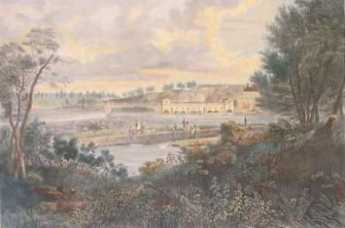
|
| Fairmount |
William Penn once had his pick of the best home sites in three states, because of course he more or less owned all three (states, that is). Aside from Philadelphia townhouses, he first picked Faire Mount, where the Philadelphia Art Museum now stands. For some reason, he gave up that idea and built Pennsbury, his country estate, across the river from what is now Trenton. It's in the crook of a sharp bend in the river but is rather puzzlingly surrounded by what most of us would call swamps. The estate has been elegantly restored and is visited by hosts of visitors, sometimes two thousand in a day. On other days it is deserted, so it's worth telephoning in advance to plan a trip.
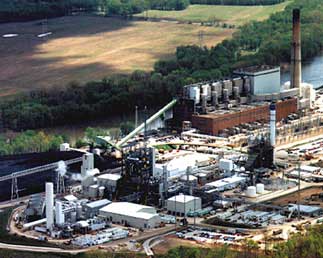
|
| Gasified Garbage |
After World War II, a giant steel plant was placed nearby in Morrisville, thriving on shiploads of iron ore from Labrador, but now closed. Morrisville had a brief flurry of prosperity, now seemingly lost forever. However, as you drive through the area you can see huge recycling and waste disposal plants, and you can tell from the verdant soil heaps that the recycled waste is filling in the swamps. It doesn't take much imagination to foresee swamps turning into lakes surrounded by lawns, on top of which will be many exurban houses. How much of this will be planned communities and how much simply sold off to local developers, surely depends on the decisions of some remote corporate Board of Directors.
However, it's intriguing to imagine the dreams of best-case planners. Radiating from Pennsbury, there are two strips of charming waterfront extending for miles, north to Washingtons Crossing, and West to Bristol. If you arrange for a dozen lakes in the middle of this promontory, surround them with lawns nurtured by recycled waste, you could imagine a resort community, a new city, an upscale exurban paradise, or all three combined. It's sad to think that whether this happens here or on the comparable New Jersey side of the river depends on state taxes. Inevitably, that means that lobbying and corruption will rule the day and the pace of progress.
Meanwhile, take a trip from Washingtons Crossing to Bristol, by way of Pennsbury. It can be done in an hour, plus an extra hour or so to tour Penn's mansion if the school kids aren't there. Add a tour of Bristol to make it a morning, and some tours of the remaining riverbank mansions, to make a day of it.
William Penn and the Corporate Model

|
| William Penn |
The Proprietorship of West Jersey is pretty much unchallenged as the oldest surviving stockholder corporation in America. A number of points could be made about this creation, but an essential one is that Penn had very few existing models to work from. Nowadays, there are thousands of corporations in existence all over the world, many of them started by men of very little education or notable intelligence. Now that the subject has been mentioned, I can confess that I started three of them, myself. As I recall, it required only an hour's visit to a lawyer's office, for an agreed fee of $500 for each one of them, and after a two-week delay, I was said to be in business.
By contrast, consider Penn's problem. He had to conceive of the idea, and decide to go forward with it in spite of probably having almost no association with any other corporation, and probably without any assistance from any lawyer who had useful experience. While it is unlikely that he designed the modern corporation, or even contributed many useful design ideas, it is also likely he was so unaware of the known features of corporate design that he was nearly in the position of re-inventing this wheel if he expected it to succeed.
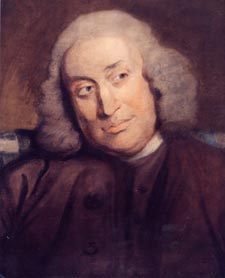
|
| Samuel Johnson |
Nowadays, a lot of entrepreneurs are in a similar state of innocence about corporate structure, but the models exist and the rules have been made and tested. An hour's conference with an accountant and a lawyer is all that is needed to avoid a million pitfalls, simply setting out on a well-trodden path. A modern businessman may go to business school and emerge with the complaint that he was not taught anything very useful, but that is far from the case. An entrepreneur doesn't need to know much about accounting, or corporate law, or tax law, or personnel management. But he does need to know that he needs the services of an accountant, a lawyer, a tax expert, and an office manager. These experts exist and provide their services as a reliable package. Back in the Seventeenth century, those professions didn't exist, and it was scarcely common knowledge that the corporation couldn't function without a number of working parts. The skill of supervision, some concept of how to find and manage capable subordinate leaders, how much to pay them, all fell to the pioneer to discover. In Penn's case, he had to have a reliable organization in order to manage, even to police, the day-to-day complexities of a staff of people going about their duties, while he went about his own. His personal chores included making personal arrangements with the King of England to acquire what has become three states: New Jersey, Pennsylvania, and Delaware; it required negotiations with the Indians, and with New York, Maryland and Virginia about their disputes with him. He had to organize the Assembly, deal with the major stockholders, and worry about wars and uprisings three thousand miles away.
As Samuel Johnson observed about a dog walking on two hind legs, the remarkable thing was not that he did it well, but that he did it at all.
Glorious Revolution: Nov. 5, 1688
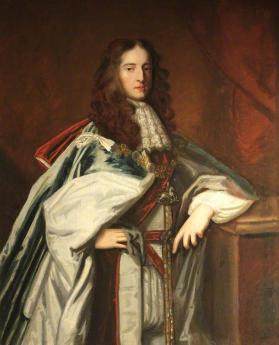
|
| William III of Orange |
The history of William III, or William of Orange, or the William of William and Mary, is mentioned in American history but not much noticed. In academic parlance, it's a topic which probably won't be on the test. By contrast, British schoolboys do learn a lot about Winston Churchill's ancestor the Duke of Marlborough who was William's commander against the French, and also the religious troubles William provoked in Ireland, but Britons mainly seem to express a bewildering relief that religious quarreling in England finally came to an end with the ascension of William and Mary to the throne. What the Irish thought about the same events is apparently just ignored. But what Pennsylvanians (and residents of Delaware and New Jersey, too) should mainly note is that when William came to the British throne, the era of William Penn's special protection by the Monarchy was over. Penn's heirs changed both their style and their religion, and worked hard to be friends of the King; but it was never going to be the same as it had been when Charles II made a promise to William Penn's father on his deathbed, that he would look after the troublesome boy.
The British populace had thought they became a Protestant nation under Henry VIII and solidified that situation under Elizabeth I. But somehow the religious issue violently re-arose under "Bloody" Mary and Cromwell. And even that was not enough; Charles II and his brother James II were secret Catholics, there seemed to be no end to this. An American gets the feeling that the British citizenry was more fed up with wrangling about Royal Religion than so much exercised about its theology. In any event, when James II produced a royal son who would almost certainly be raised a Catholic, it was just too much for most of his subjects. James just had to go.
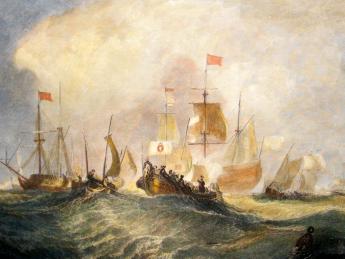
|
| Landing at Torbay |
The most likely Protestant king available was William of Orange, the Dutch king. William himself was eager to have more allies for the Netherlands because the French king Louis XIV was busily swallowing up his weaker neighbors and the Netherlands were probably next. His wife, Mary, was the daughter of James II, so the legitimacy of his line was assured. Urged on by members of the British aristocracy and several powerful members of Parliament, he built a fleet which was alleged to be needed against Algerian pirates and soon set sail for England. Fearing French attack while his troops were in England, William had made extensive alliances in British military circles, and when he arrived he was more or less acclaimed, bloodlessly. For whatever reason, James II put up a very little fight was imprisoned briefly in a way that invited escape and left for France. And so William and Mary were victors in a bluffing game which James did not resist very hard, and were the monarchs of a Protestant nation. However, Ireland was Catholic and resisted, leading to bloody suppression which is still muttered about in Irish taverns, and fought over in Northern Irish elections.
Meanwhile, we all know what was happening to William Penn. He had a stroke, his steward in England and Logan in Pennsylvania "stole him blind", and the greatest private landowner in British history went to debtor's prison. Hardly any of this is imaginable under the Stuart kings. And for that matter, the later behavior of George III is not imaginable under the Stuart kings, either.
Billy Penn's Hat
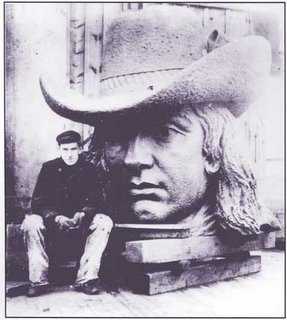
|
| Billy Penn's hat |
Philadelphia City Hall was intended to be the tallest building in the world, so there was no reason to suppose anything in Philadelphia would be taller. Gradually, taller buildings in other cities were built, but there grew up a gentleman's agreement that no skyscraper would be built in Philadelphia that was taller than William Penn's hat atop his statue on the tower of City Hall. Planning in the city was organized around this premise, which affects subways and other transportation issues in the city center. Because of assassination fears, a similar tradition in Washington DC was enacted into law, and it must be admitted that the flat skyline of that city looks a little dumb and boring. But Philadelphia neglected to pass a law, and so at the end of the Twentieth Century first one and then half a dozen skyscrapers were built that were twice the height of City Hall, immediately destroying the organizing visual center of the city. Pity.
But there are more serious issues involved. Aesthetics aside, who cares if someone bankrupts himself building an inappropriately tall building, with excessive elevator costs, problems with reinforced foundations, shortage of parking space, and the like? And the answer to that is the new tall building will bankrupt the older office buildings, not itself. Using offers of low, low rents to fill the new building, tenants will be drained from other spaces, and other areas of the city will deteriorate unless there happens to be a general shortage of office space in the region. Carried to an extreme, all of the center city business might be envisioned to reside in one thousand-story building, and the rest of the region would be a desert.
The obvious response would be that no landlord wants to have competition, and new construction is the way a city renews itself, creatively destroying the old to make room for the new. You must not allow the vested landlords to capture the political process with agitation if not bribes. Push things too far in that direction, and you will find that political corruption has destroyed the fabric of the town more effectively than a couple of skyscrapers ever could. Market East has been devastated, it is true. But that's the price of conducting the commerce of the region on the basis of market economics instead of through bureaucracy which masks corrupt politics with high-flown language. Paris is beautiful, but France has 12% unemployment which is closer to 16% if you remember the 30-hour week, the nine-week vacations, and retirement age in the fifties.
And yet, there is certainly a point to be made here. The height limit on new construction must bear some relationship to the regional need for new office space, and not merely rely on beggar-my-neighbor. We're currently hearing about two new projected skyscrapers, one beside 30th Street Station, and the other at 17th and Market/Chestnut. The decision to go or no-go will rest with whether the developers can find "lead" tenants. The corporate officers of these large enterprises are the ones who must be expected to give careful consideration to the best interest of the community because right now they are the ones who control matters. If they neglect their responsibilities, the pressure to pass more zoning laws will prove hard to resist.
The Walking Purchase
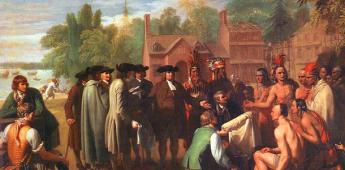
|
| William Penn and the Indians |
Any fair discussion of Quaker relations with the Indians must emphasize that almost all other colonists of the time regarded Indians as subhuman components of the local wilderness. Only William Penn was careful to treat the Indians as fellow human beings, entitled to fair play, dignity, and respect. Like a good politician, he entered into their games with enthusiasm and definitely earned their respect by outdoing them all in the broad jump contests. Even though he had bought the land from King Charles II, he took care to buy it a second time from the Indians, and for many decades was able to enforce the wise rule of never permitting settlers on the land before the Indians agreed to its purchase. After Penn's death, however, and particularly from 1726 to 1736, a major wave of German and Scotch-Irish immigration created an overwhelming population pressure on the seaboard areas, resulting in much unauthorized pioneering and settlement. Since William Penn spent only a few years in the colonies his agents chiefly James Logan, had long set the tone.
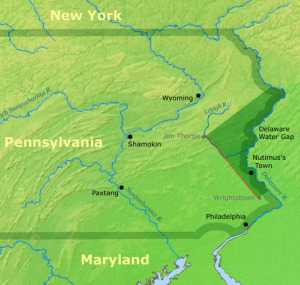
|
| Walking Purchase |
Logan had been equally famous for his many efforts to treat the Indians fairly, and the grounds of Stenton, his manor house, were often filled with Indians come to pay their respects. Against all this evidence of the benign attitudes of both Penn and Logan, there stands the episode of the Walking Purchase of 1737. No doubt about it, the Indians were treated badly.
In the triangle between the Neshaminy Creek and the Delaware River, the Delaware Indians agreed to a sale with the third side of the triangle established at a distance from Wrightstown, as far as a man could walk northward toward the Wind Gap in a day and a half. That was a common form of boundary for Indian land sales, and its distance was fairly well understood. In anticipation of pacing out the distance, the colonists sent out explorers to find the easiest path, then sent out woodsmen to clear a path in the forest, and selected three of the fastest runners in the colony to do the running. The pace was so fast that two of the runners had to drop out, and the third one nearly did so. The resulting boundary was nearly twice as far into the wilderness as was commonly accepted for the measurement, taking advantage of the sharp bend in the river which widened the land in question by a great deal. The Indians were so disgusted they refused to leave the territory. Logan had already made an agreement with the Iroquois nation, to whom the Delawares were subject, and the Delawares only surrendered the land when the Iroquois began to look as though they really would act as enforcers for the bargain. Although serious Indian warfare did not break out for another twenty years, the Walking Purchase went a long way toward convincing the Delaware tribe that the Quakers were no more trustworthy than the settlers in other colonies, and is said to have been on their minds when twenty years later they helped the French decimate General Braddock's army.
There will probably never be a clear resolution of the paradox of Quakers, particularly Logan, behaving in this reprehensible manner within a very long history of the unusually honorable treatment of the Indians. With William Penn now dead and gone, no doubt Logan was caught in a squeeze between the two rather dissolute sons of William Penn, neither of them Quaker, who had over-indebted themselves with high living and were pressing their agent to make land sales to pay for it. Then there was the pressure of the new German and Scotch-Irish immigrants, brought to the New World by real estate promises, and stranded in the seaport unable to complete their land purchases. Under this pressure, Logan may have been unduly persuaded that the 1684 treaties with the Indians, along with many other treaties and understandings, were all the legal justification he needed. Whatever the specifics of the situation at the time, it is now clear the Walking Purchase was a blot on the Quaker record that can never be entirely justified within the Quakers' own standards of fairness. Within the Society of Friends, whatever other English colonists might have done in their position, let alone what French and Spanish regularly did to the Indians, doesn't matter in the slightest.
Pennsylvania Prison Society
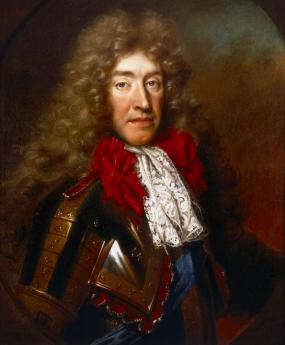
|
| Duke of York |
William Penn, who spent considerable time in British prisons, established a penal code for his new colony which largely swept away the draconian punishments established by the code of the Duke of York. Until as late as 1780, jails were mainly confinement hotels for debtors, prisoners awaiting trial, and witnesses. For actual punishment, the methods were execution and flogging. Penn's Code for Pennsylvania restricted execution to the crime of murder, and flogging to sexual offenses; everything else was punished by fines and imprisonment. Hidden in this code, of course, was the need to invent and construct prisons to service the imprisonment. It would take over a century to address this need, and Philadelphia still has not completely caught up with the need for more prison cells. Without a prison system, the Penn code was impractical, and the colonial penal code retrogressed toward floggings, pillories, and hangings after Penn's death.
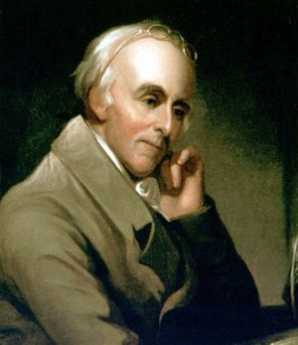
|
| Dr. Benjamin Rush |
In colonial Philadelphia, the main prison was on Walnut Street, with sixteen cells. A neighboring Quaker, Richard Wistar, started a soup kitchen in his own home, taking the soup over to prisoners. By 1773, he had established the Pennsylvania Society for Assisting Distressed Prisoners, which was unfortunately disbanded by the occupying British Army in 1777. In 1783, Dr. Benjamin Rush with the assistance of Benjamin Franklin, Bishop White, and the Vaux family, founded the Philadelphia Society for Alleviating the Miseries of Public Prisons, which after a century changed its name to the Pennsylvania Prison Society. The Prison Society believes it is the oldest continuous non-profit society in America.
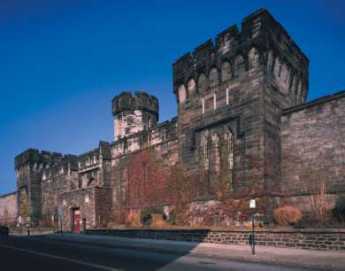
|
| Eastern State Penitentiary |
The Prison Society has had several major changes in direction. The original concept was to substitute public labor for imprisonment, a less costly arrangement than imprisonment while avoiding a return to floggings and dismemberment. However, the degrading sight of prisoners in chain gangs caused a public outcry, and the approach was abandoned. In the spirit of the French and American revolutions, loss of liberty was seen as the greatest punishment conceivable. Added to this was the Quaker concept of inspiring remorse through silent meditation, and the eventual outcome was the construction of the Eastern State Penitentiary on what was then called Cherry Hill. In 1823, it was ominous that Eastern State Penitentiary was the largest structure in America. Although the concept was widely admired and imitated, the prolix Charles Dickens took a violent dislike to the idea of never talking to anyone, and led a reversion away from penitentiaries back to simple prisons. In the days before Alzheimers and schizophrenia were well characterized, the spectacle of massive recidivism was added to the rumor that protracted solitude led to insanity.

|
| Catherine Wise |
From Catherine Wise the Communications Director of the Pennsylvania Prison Society, the Right Angle Club recently learned that the current evolution of the American penal system has led to a steady state, but a troubled one. There are 2.2 million inmates in American prisons today, more than any other nation including Russia and China. Of these, 75,000 are confined in Pennsylvania, 9,000 in Philadelphia. Recidivism is 67%, the cost is $31,000 per year per inmate, the majority of inmates have been involved with illicit drugs, a growing number are infected with HIV and Hepatitis C, mental illness runs around 20%. The cost of incarceration is growing faster than the cost of either education or healthcare for the community. Prison overcrowding is extremely serious, the programs for managing parole and integration back into society are weak and underfunded. Eighty percent of the inmates are non-white, most prisons are located in remote regions too far for easy visiting, medical care in prison would not seem at all acceptable in general society. The Prison Society has no difficulty finding projects which are urgently needed. Just for an example, take the peculiar prison statistics; it really seems improbable that only 9,000 of the 75,000 Pennsylvania prisoners are in Philadelphia. Then reflect, NIMBY, that no one wants a prison or its visitors near his home, except areas of rural poverty welcome the employment a prison brings. Reflect for a moment that "jails" are paid for by local county taxes and contain prisoners with less than two years to serve. "Prisons" are paid for with state taxes, and contain those sentenced to longer than two years. Finally, add the fact that nonvoting Philadelphia prisoners in rural prisons are counted by the census as residents of the rural area for the purpose of distributing legislative and congressional seats. The rural politicians love the system, the urban neighbors love to be rid of the prison environment, but the prisoner families can't visit the prisoner. Who cares? Who even notices?
During the first World War, Quaker interest in prison matters was greatly stimulated by the imprisonment of many Quaker conscientious objectors to the wartime draft; since that time prison conditions have again become a central interest of the religion. It's hard to prove but is confidently asserted, that violence and mistreatment of prisoners are appreciably less in Pennsylvania than the rest of the country, California for example. In any event, The Pennsylvania Prison Society is a particularly effective advocate for humane treatment because of credibility achieved over two centuries, with newspaper editors on its board, and sympathetic affiliations with the legislative judicial committees. It knows what it is talking about, as a result of over 5000 annual prison visitations, and it has served the prison administrative corps by performing volunteer work, accepting contracts for parole projects, arranging bus trips for prisoner families to remote prisons, and working for improved funding for prisons. At the moment, there are six highly imaginative bills before the Pennsylvania Legislature, devised and researched by this outside organization with credibility, and political clout. Although the Society takes an occasional contract for a project, it is itself entirely funded by outside contributions, and because of occasional adversarial situations, asks for no funds from the state. Even the contract funds have been questioned, and are only accepted when the working relationships fostered are more useful for the prisoner clients than any co-option which might result.
One final word about medical care in prison. It's not as good as medical care for non-prisoners, and unfortunately it probably never can be. The remote rural location of prisons makes it difficult to obtain physicians and nurses, regardless of wage levels. It's dangerous to be around prisoners, as any guard will tell you, and it's more dangerous to be in control of narcotics amidst a population of addicted convicts. Malingering is nearly universal, both to obtain desired drugs and to spend "easy time" in the infirmary. Many prison escapes are engineered around the necessarily weakened security of the medical system. The prison budgeting system has all the rigidity and weaknesses of any governmental medical system, and in this case, it's run far out of sight of the public. Even the bureaucrats in charge are victimized by other bureaucrats. The average duration of incarceration in Pennsylvania is longer than in most other states; the prisons have to keep mental patients because the mental hospitals have all been closed. Fifty years ago, when there was no place to put a non-criminal with tuberculosis, he was put in jail. The parole system is underfunded, there is not nearly enough community support to absorb ex-con. Behind all this is a shortage of prison facilities. The legislature has got itself into a position that if it moved more prisoners into the outside, more prisoners would just fill the vacancies, costs would go up, and things wouldn't look much better. Only after the backlogs have been absorbed, would there be much visible effect.
East Jersey's Decline and Fall
The colony of New Caesaria (Jersey) had two provinces, East and West Jersey, because the Stuart kings of England had given the colony to two of their friends, Sir George Carteret and John, Lord Berkeley, to split between them. Both provinces soon fell under the control of William Penn but it took a little longer to acquire the Berkeley part, so the Proprietorship of East Jersey was the oldest corporation in America until it dissolved in 1998.
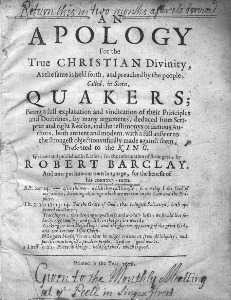 |
| Apology for the True Christian Divinity |
It would appear that Penn intended West Jersey to be a refuge for English Quakers and East Jersey was to be the home of Scots Quakers. Twenty of the original twenty-four proprietors were Quakers, at least half of them Scottish. Early governorship of East Jersey was assumed by Robert Barclay, Laird of Urie, who was certainly Scottish enough for the purpose, and also a famous Quaker theologian. Even today, his Apology for the True Christian Divinity is regarded as the best statement of the original Quaker principles. However, Barclay remained in England, and his deputies proved to be somewhat more Scottish than Quaker. Eighteenth-century Scots were notoriously combative and soon engaged in serious disputes with the local Puritans who had earlier migrated into East Jersey from Connecticut with the encouragement of Carteret. This enclave of aggressive Puritans probably provided the path of migration for the Connecticut settlers who invaded Pennsylvania in the Pennamite Wars, so the hostility between Puritans and Quakers was soon established. The Dutch settlers in the region were also combative, so the eastern province of Penn's peaceful experiment in religious tolerance started off early with considerable unrest. Of these groups, the Scots became dominant, even referring to the region as New Scotland. To look ahead to the time of the Revolution, most of the East Jersey leadership was in the hands of Proprietors of Scottish derivation, with at least the advantage that these were likely to have been very vigilant in seeing Proprietor rights originally conferred by the British King, continue to be honored by the new American republic.
East Jersey was probably already the most diverse place in the colonies when loyalists and revolutionaries took opposite sides in the bitter eight-year war over English rule, with hatred further inflamed when the victors in the Revolution divvied up the properties of loyalists who had fled. The earlier conflict was created by management blunders of the Proprietary leadership itself. Instead of surveying and mapping, before they sold off defined property, like every other real estate development corporation, the East Jersey Proprietors adopted the bizarre practice of selling plots of land first and then telling the purchaser to select its location. In the early years, it is true that good farmland was abundant, but inevitably two or more purchasers would occasionally choose overlapping plots of land. The Proprietors were astonishingly indifferent to the resulting uproar, telling the purchasers that this was their problem. The outcome of all this friction was that settlers petitioned London for relief, and in 1703 Queen Anne took governing powers away from both the East and West proprietorships and unified the two provinces into a single crown colony. The Queen obviously nursed the hope that South Jersey would impose a civilizing influence on the North, but immigration patterns determined a somewhat opposite outcome. Both proprietorships, however, were allowed to continue full ownership rights to any remaining undeeded property.
In later years, the East Jersey Proprietors created more unnecessary problems by attempting to confiscate and re-sell pieces of land whose surveys were faulty, sometimes of a property occupied with houses for as much as fifty years. This East Jersey proprietorship, in short, did not enjoy either a low profile or the same level of benevolent acceptance prevailing in the West Jersey province. A climate of skepticism developed that easily turned any management misjudgment into a confrontation.
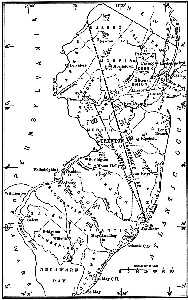
|
| New Jersey Line |
The East Jersey proprietorship operated by taking title to unclaimed land, and then reselling it. In what seemed like a minor difference, the West Jersey group never took title itself, but merely charged a fee for surveying and managing the sale of unclaimed land. The upshot of this distinction was that the East Jersey group got into many lawsuits over disputed ownership, which the West Jersey Proprietorship largely escaped. The nature of unclaimed land in New Jersey is for ocean currents to throw up new islands in the bays between the barrier islands and the mainland, or pile up new swampland along the banks of the Hudson and Delaware Rivers. Such marshy and mosquito-infested land may have little value to a farmer but lately has become highly prized by environmentalists, who supply class-action lawyers with that nebulous legal concept of "standing". The posture of the West Jersey Proprietors is to be happy to survey and convey clear title to a particular property for a fee, but a buyer must come to them with that request. The East Jersey method put its proprietors in repeated conflict over possession and title, with idealists enjoying free legal encouragement from contingent-fee lawyers. By 1998, the Proprietors of East Jersey had endured all they could stand. Selling their remaining rights to the State for a nominal sum, they turned over their historic documents to the state archives. The plaintiff lawyers could sue the state for the swamps if they chose to, but the East Jersey Proprietors had just had enough.
The only clear thing about all of this is that the Proprietors of West Jersey now stand unchallenged as the oldest stockholder corporation in America. It's not certain just what this title is worth, but at least it is awfully hard to improve on it.
William Penn, Justice Holmes, and the Inner Light
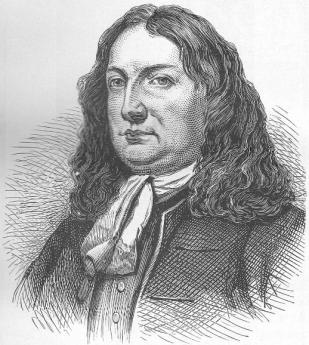
|
| William Penn |
WILLIAM Penn and Oliver Wendell Holmes, both lawyers, can be imagined debating fiercely across two centuries, about The Inner Light. Holmes famously stated his position at the opening of his book The Common Law : "The life of the law has not been logic, it has been experience." Penn, on the other hand, urged his Quaker followers to strip away centuries of books, teaching, and traditions, viewing in quiet contemplation their individual Light Within. Since the other central Quaker belief is that "there is that of God in every man", the implication is that it is open to everyone to know the right behavior by thinking hard enough about it. No books, preachers, ceremonies needed, and in fact, such tokens of society's experience can be badly misleading. Penn did not forcefully pursue how much of the outcome came directly from God and how much was then elaborated by logic; his point was the truth is most readily discovered by contemplation, uncluttered by the world's discussion.
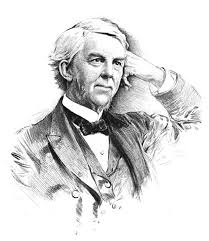
|
| Oliver Wendell Holmes |
That Penn would have acknowledged some truth to Holmes' position can be surmised from the struggle he had with the argument that solitary contemplation cannot lead to an organized moral code of behavior within a society. The example of his time was the Hippie generation, is a more familiar example. What is to prevent a society which depends on silent introspection from concluding that monogamy,personal Hygiene,, and recreational drug avoidance are useless intrusions into the joy of personal freedom? Responses having to do with sexually transmitted disease, harm to the education and welfare of unparented children, disagreeable responses to the undesirable body odors of others, and the spread of addiction by example to those who wish to minimize unnecessary temptations, are all examples of hostility by others who may not have achieved equal illumination from their inner lights. Over centuries of observed experience, societies have reached comparatively similar views on what behavior should be prohibited by force, or discouraged by social pressure. Societies which reach these conclusions may hold themselves open to discussion, but often assert a right to punish those who violate the codes without offering plausible arguments beyond merely mystical ones, closed to debate.
Penn's response to such critiques was of the nature of insisting that Quakers obey the law unless the law insists on behavior prohibited by their religion. Within the realm of unwritten societal pressures, Penn was more relaxed. Sometimes he urged bizarre behavior having to do with hats and clothing, as a silent reproach to society on some issue, but in general, he urged that Quakers consider themselves Protestant Christians as a general guide to behavior. A century after he died, most Quakers were abandoning plain dress and plain speech as not plain at all, but ostentatious. Pointless and therefore ostentatious eccentricity could be harmful to the occasional truly important witness about such things as conscientious objection to war. If the considered purpose is to be taken seriously, eccentric behavior about trivial issues is to be avoided.
The Ghost of William Penn: Father, Mother, Memories, Skedaddle Thomas R. Smith, a.k.a., William Penn
Times Penn Spent in Delco: by Thomas R. Smith,
A Brief WILLIAM PENN CHRONOLOGY, 1644-1718
Born October 14,1644, in Tower Hill, London, England. Father Sir William Penn, Admiral who conquered Jamaica for King Charles II. Mother, Margret Jasper Vanderschuren, daughter of a Dutch merchant.
Education: Protestant Academy, Chigwell School, Oxford, Christ Church
Published a plan for "United States of Europe, EuropeanDyet, Parliment or Estates"
1666Joined Religious Society of Friends (Quakers)c.age 22 Outstanding swordsman. but frequent companion of George Fox.
1680 c. May. Petitions Charles II for a colony in America. June. Crown officials begin their consideration of WP's petition.
1681 January-February. Crown officials revise WP's draft of the charter for Pennsylvania.
4 March. Receives his charter for Pennsylvania.
14 March. Son William Penn, Jr. (1681-1720) is born.
April. Appoints William Markham as deputy-governor of Pennsylvania.
Writes Some Account of Pennsylvania, his first advertising pamphlet.
Spring-summer. Begins work on his constitution for Pennsylvania.
June. Begins lobbying to secure the lower counties (Delaware) from the Duke of York.
July. Announces his plan of land distribution in Pennsylvania.
July-August. Publishes a Map of Pennsylvania.
Takes his first land selling trip to Bristol.
August. His deputy governor arrives in Pennsylvania.
16 September. Writes to planters in Maryland, claiming the northern quarter of that colony.
September-October. Sees his first settlers and land commissioners off to Pennsylvania.
October. Writes a letter of friendship to the chiefs of the Delaware Indians.
1682 January-April. WP and Thomas Rudyard complete the first constitution and laws for Pennsylvania.
February-March. The Free Society of Traders founded.
c. 1 March. His mother, Lady Margaret Penn, dies.
25 April-5 May. Publishes his Frame of Government and Laws Agreed upon in England.
15 July. His agents conclude their first deed with the Delaware Indians.
24 August. Receives the deeds to the lower counties (Delaware) from the Duke of York.
30 August. Sails for America on the Welcome.
28 October. Lands at New Castle, Delaware.
October-November. Visits Chester, Pennsylvania, and the site of Philadelphia.
November. Visits New York and East New Jersey.
December. His first Assembly convenes at Chester.
Meets with Lord Baltimore concerning the Maryland-Pennsylvania boundary dispute.
Twenty-three ships arrive in 1681 -1682; the colony grows rapidly.
1683 January. Quakers begin meeting in Philadelphia; the Philadelphia County Court is established.
March. Visits East New Jersey and sits on its Council. Begins distributing large numbers of Philadelphia lots. His second Assembly approves a revised Frame of Government. 29 May. Meets with Lord Baltimore at New Castle. Spring-summer. Acquires his country manor Pennsbury, in Bucks County.
August. Writes Letter to the Free Society of Traders.
August-September. Tries to buy Susquehanna Valley lands from the Iroquois, but is blocked by New York's Governor Thomas Dongan.
September-November. Many ships arrive; both Philadelphia and Pennsylvania continue to expand.
October. Germantown surveyed.
November. Attempts to collect his quitrents.
1684 March. The Welsh Tract surveyed.
April-May. Decides to return to England to defend his boundary against Lord Baltimore.
May. Lord Baltimore leaves for England.
The Assembly passes an excise tax, which WP suspends.
July. Philadelphia's waterfront residents protest WP's city land distribution policy.
August. Prepares to leave for England; appoints Thomas Lloyd president of the Provincial Council.
18 August. Sails for England from Lewes, Delaware.
5 October. Lands at Worthing, Sussex.
October. Writes to Thomas Lloyd to get copies of documents needed for his defense against Lord Baltimore.
Meets with Charles II and the Duke of York.
December. The Lords of Trade postpone the hearing of the Penn-Baltimore controversy.
Died July 30, 1718, Ruscombe, UK.
The Origin of States Rights, a Rumination
ALMOST alone among the British colonies in America, Pennsylvania's western border was specified in the King's charter of the colony. It was "five degrees longitude west of the point where the eastern boundary crosses the Delaware" [River]; however, its actual location on the ground was not actually marked until 1784. It's a few miles west of the present city of Pittsburgh, located at the forks of the Ohio River, where the Allegheny and Monongahela Rivers join. However, until 1784 it was not a certainty that this complex was within Pennsylvania instead of Virginia. The origin of Ohio is at the only major water gap in the North-South mountains, and the tributary rivers are fairly large. The three merging rivers thus form a nearly continuous water route along the base of the mountain range, from the Great Lakes south to Pittsburgh, or from the Chesapeake Bay north to Pittsburgh, and then to the Mississippi, going past the best topsoil farming land in the world. The forks of Ohio were the great prize of the Seventeenth and Eighteenth centuries, the place where young George Washington himself started the French and Indian War. To include these treasures, it seems vaguely possible that William Penn insisted on having the border of his state safely include the water gap at the beginning of Ohio. Perhaps not, of course, perhaps it was just a sense of tidiness on the part of the ministers of Charles II. The original document stated that the border was a hundred miles east of there, to match where Maryland ended. When the document was returned to Penn by the King's ministers, however, it had the new language.
The existence of this north-south termination of Pennsylvania began to take on a new significance when other states made claims for their land grant to extend to the Pacific Ocean, and the extensions collided with each other. Virginia then developed its territory to include modern Kentucky and West Virginia. That resulted in Virginia's land aspirations veering northward, to include the Ohio Territory west of Pennsylvania's fixed boundary. By the legal standards of the day, Virginia had a fairly good claim to all of the Indian territories, not merely to the west of Pennsylvania, but extending at least to the Great Lakes, perhaps farther. Maryland, Connecticut, New York, and Massachusetts had conflicting claims from an infinite extension of their western boundaries. As a consequence, it was impossible to achieve ratification of the Articles of Confederation for five years. The various states involved were fearful of the creation of a combined political entity might result in a court which would be enabled to rule against their individual aspirations. The stakes were high; the land mass involved would be several times as large as England.
The person who finally broke this deadlock might well have been Robert Morris, who was disturbed that this inter-state dissension was injuring his ability to borrow foreign funds for the Revolutionary War. The internal negotiations took place under wartime conditions, and are poorly researched. No doubt some person deserves credit for bringing this wrangle to a close. Virginia had the strongest claim, New York the weakest. New York gave up its claim first, Maryland was the last, and Virginia the most disappointed. Pennsylvania, unable to make a claim, took the position that the land belonged to everyone, and eventually was mollified by getting a small notch of land extending to the Great Lakes at Erie. It must be noticed in passing that final resolution of the land claims came at the Treaty of Paris ending the Revolution. Benjamin Franklin, soon to become President of Pennsylvania, was the negotiator of the treaty which reflected Pennsylvania's position that the land belonged to all of us, right?
Even without these western land claims, Virginia was the largest and richest of the colonies, and rather easily adopted the attitude that Virginia would be the leader of the new United States. From their viewpoint, the preservation of states rights would enhance Virginia's leading the country. More or less immediately, the attitude of small states like Delaware hardened into resistance that this must not happen. Much otherwise inexplicable behavior also begins to make a sort of sense: the perverse behavior of the Lee family in the Continental Congress, the quarrels within George Washington's cabinet, the relocation of the capital and the dreams of the Potomac as the nation's main portal of transportation, the rise of Jefferson's political party, the obstructionist behavior of Patrick Henry, the Virginia domination of the Presidency for decades, and countless less famous episodes of history -- make more sense as residuals of Virginia's early land aspirations, than as defenses of slavery or philosophical convictions that states were somehow superior to nations. These suspicions are difficult to clarify and impossible to prove. The best way to see some substance to them is to imagine yourself in the Virginia House of Burgesses, politically connected and vigorous, able to imagine your descendants all inheriting a county or two of rich land as a remote consequence of a few glamorous deeds by their Cavalier ancestor.
On the Making of Boundaries: PA/NY
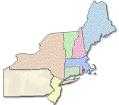
|
| North East US |
Ask yourself if you can think of any boundary of any country in Europe or Asia -- which is a straight line. There aren't any, at least to speak of, but in America lots of States have straight-line borders. In every place except America (and later, Africa and the Near East) borders were always "natural" borders, which for the most part meant they followed either rivers or (what is essentially the same thing) the ridges of mountains, forming the edges of river basin drainage. You can see why this is so; it keeps cattle and children from wandering off the property and lessens the chance that one group will pollute the headwaters of someone else's water supply. Rivers and mountain ridges make natural defense barriers, and for the most part, they don't move around and start arguments.
Now, ask yourself what you would do if you were King and somebody handed you a piece of parchment drawn with the roughest of maps, asking you to give away pieces of some unexplored continent that took two dangerous months of travel to get to. In the Sixteenth Century, no one knew where the American mountains and rivers ran. And as a matter of fact, the north-to-south coast of North America was considerably tilted to the East, so most coastal rivers ran in a Northerly direction instead of due West. But who knew, for certain? So, the tendency was to make land grants from the mouth of one river to the mouth of another one, with their Northern, Southern and Western boundaries kind of vague. In the case of Pennsylvania, the Eastern border was the West bank of the Delaware River, which was easy enough, and the King gave New York A Strip of land Following the Hudson River. The lucky thing is that the Mohawk River turns Sharply left at Albany the head of the Hudson, and then this extension of the Hudson really does run straight West. So it was easy enough to agree that the Northern border of Pennsylvania would be a straight line a hundred or so miles to the south of the Mohawk, more or less parallel to it, through a dense forest no one cared much about. This arrangement had the beauty of cutting off Connecticut's Claims created by haphazard wording of the grant from Charles II. This satisfied everybody for eighty years until vacant land became scarce and someone in Connecticut got the bright idea of resurrecting the King's old "unnatural" boundaries as two pieces on either side of New York. As a matter of fact, Connecticut got the idea that the Hamptons on Long Island ought to belong to them, too. We shot a few hundred people and then that, too, was settled. As a later addendum, the Penn proprietorship wanted guaranteed access to the Great Lakes, so a little piece along Lake Erie was Sold to them in 1792 for $151,640, thus completing the present boundaries of northern and eastern Pennsylvania.
To the south, although fewer people got scalped and/or shot, dealing with Lord Baltimore and his descendants proved to be a far less agreeable experience.
| Posted by: Sunny | Apr 22, 2011 6:24 AM |
| Posted by: Michelle Jackson | Oct 24, 2008 1:21 PM |
| Posted by: meagain | Oct 17, 2007 11:42 AM |
| Posted by: George Fisher | Sep 26, 2007 8:34 PM |
| Posted by: marydawn | Sep 17, 2007 3:52 PM |
30 Blogs
William Penn, Excellent Lawyer, Terrible Businessman
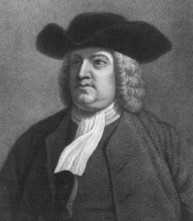 William Penn was the central force in the establishment of a religion, Quakerism, certain central features of the legal system, three colonies of America, and many of the central concepts of Constitutional Law. He leaves us over three thousand documents, but it remains very hard to form a picture of what he was like.
William Penn was the central force in the establishment of a religion, Quakerism, certain central features of the legal system, three colonies of America, and many of the central concepts of Constitutional Law. He leaves us over three thousand documents, but it remains very hard to form a picture of what he was like.
The Ghost of William Penn
Thomas R. Smith recounts the upbringing of the famous Pennsylvania founder, William Penn, through the form of a first person letter to the state's current residents.
William Penn, Robert Barclay and the Ranters
The early Quakers were hard to tell from other Dissenters. Robert Barclay and William Penn set out what made them distinctive.
Jury Nullification
 William Penn demonstrated one of the most incisive legal minds in England by trapping the British courts in what remains a central unresolved dilemma for the law. He was the defendant in his own case. By the South's way of looking at things, it was a pacifist effort to restrain mindless abolitionism. Meanwhile, both sides calculated it would win if the South decided to fight.
William Penn demonstrated one of the most incisive legal minds in England by trapping the British courts in what remains a central unresolved dilemma for the law. He was the defendant in his own case. By the South's way of looking at things, it was a pacifist effort to restrain mindless abolitionism. Meanwhile, both sides calculated it would win if the South decided to fight.
Jersey
 Understanding New Jersey means understanding its unusual geography, and its Quaker origin as one of the three colonies owned by William Penn.
Understanding New Jersey means understanding its unusual geography, and its Quaker origin as one of the three colonies owned by William Penn.
Line Dividing East from West Jersey
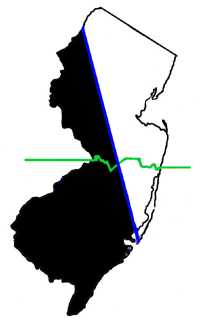 Although England had owned New Jersey for 17 years, it was unsettled until purchased by Quakers. By 1684 ownership was totally in the hands of two Proprietorships, or corporations, of Quakers. The boundary separating East from West Jersey was a line of 150 boulders from Beach Haven to Trenton. Every land title in the state is based on this survey.
Although England had owned New Jersey for 17 years, it was unsettled until purchased by Quakers. By 1684 ownership was totally in the hands of two Proprietorships, or corporations, of Quakers. The boundary separating East from West Jersey was a line of 150 boulders from Beach Haven to Trenton. Every land title in the state is based on this survey.
Concessions and Agreements
 Most 17th Century colonies were proprietorships, requiring agreements for local autonomy without losing allegiance to the home country. William Penn cleverly expanded the New Jersey document into the intellectual precursor of the U.S. Constitution.
Most 17th Century colonies were proprietorships, requiring agreements for local autonomy without losing allegiance to the home country. William Penn cleverly expanded the New Jersey document into the intellectual precursor of the U.S. Constitution.
WILLIAM BLATHWAYT'S DRAFT OF THE CHARTER OF PENNSYLVANIA
William Blathwayt was clerk of the British Board of Trade. His draft of Penn's charter for Pennsylvania was essentially a staff proposal for the King to sign. It conforms to the final charter in all but minor wording [,punctuation, and emphasis marks].
The Naming of Pennsylvania
 King Charles gave Penn as much land as the whole of England, and named it after William Penn
King Charles gave Penn as much land as the whole of England, and named it after William Penn
William Penn: Visionary with Persuasiveness
 Even when we know how it eventually turned out, it is hard to imagine how William Penn would dare to suppose the King might give him Pennsylvania, and even harder to understand how he managed to negotiate the agreement.
Even when we know how it eventually turned out, it is hard to imagine how William Penn would dare to suppose the King might give him Pennsylvania, and even harder to understand how he managed to negotiate the agreement.
Unalienable Rights Before 1776
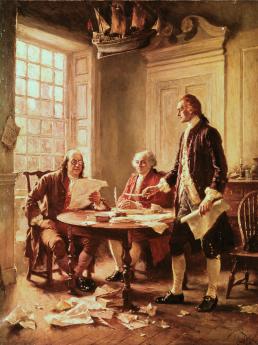 Lawyers commonly say the Declaration of Independence "informs" the Constitution. But prior informing was performed by William Penn, the Roman Empire, and Hammurabi.
Lawyers commonly say the Declaration of Independence "informs" the Constitution. But prior informing was performed by William Penn, the Roman Empire, and Hammurabi.
Germantown Before 1730
 The early German settlers of Germantown were religious intellectuals, with a Swiss background and a history of religious martyrdom.
The early German settlers of Germantown were religious intellectuals, with a Swiss background and a history of religious martyrdom.
William Penn Conducts a Witchcraft Trial
 A public official has to obey the law, and conform to the traditions of his office, even if it is obvious that he thinks the whole thing is silly and unfair.
A public official has to obey the law, and conform to the traditions of his office, even if it is obvious that he thinks the whole thing is silly and unfair.
Bristol, PA
 Bristol is at a narrow point of the river, long the main crossing point for New York-to-Philadelphia traffic. William Penn placed his mansion nearby and for decades Bristol was a flourishing social center. The Pennsylvania Railroad cut it off, just as it cut off New Castle, Delaware, and both towns are now essentially museums.
Bristol is at a narrow point of the river, long the main crossing point for New York-to-Philadelphia traffic. William Penn placed his mansion nearby and for decades Bristol was a flourishing social center. The Pennsylvania Railroad cut it off, just as it cut off New Castle, Delaware, and both towns are now essentially museums.
Pennyslvania's Boundary: David Rittenhouse, Hero, Lord Baltimore, Villain
 Because a local genius invented and perfected surveying instruments, America is one of the few nations in the world with straight-line boundaries.
Because a local genius invented and perfected surveying instruments, America is one of the few nations in the world with straight-line boundaries.
Forming the State of Delaware
 In 1632, King Charles I granted to the Maryland proprietor coastal land with a northern border at the 40th parallel. In 1682, his son James the Duke of York evicted the Dutch from the Connecticut River to Cape Henlopen; afterward, his brother King Charles II gave away New Jersey and Pennsylvania, leaving York with New York plus a strip of wilderness from Pennsylvania to Henlopen. York then gifted that southern strip to William Penn before anyone realized there was a sloppy overlap with Maryland of thousands of square miles. Lawsuits are galore.
In 1632, King Charles I granted to the Maryland proprietor coastal land with a northern border at the 40th parallel. In 1682, his son James the Duke of York evicted the Dutch from the Connecticut River to Cape Henlopen; afterward, his brother King Charles II gave away New Jersey and Pennsylvania, leaving York with New York plus a strip of wilderness from Pennsylvania to Henlopen. York then gifted that southern strip to William Penn before anyone realized there was a sloppy overlap with Maryland of thousands of square miles. Lawsuits are galore.
The Proprietorships of William Penn
 William Penn owned Pennsylvania, New Jersey, and Delaware; as the proprietor, he was the largest private American landowner, ever. Although the Revolutionary War mostly ended that, one of his proprietorships still owns all unclaimed land in southern New Jersey.
William Penn owned Pennsylvania, New Jersey, and Delaware; as the proprietor, he was the largest private American landowner, ever. Although the Revolutionary War mostly ended that, one of his proprietorships still owns all unclaimed land in southern New Jersey.
Pennsbury Manor
 The Delaware River takes an abrupt right turn at Trenton, creating extensive wetlands for miles around. Whatever its environmental drawbacks, the river delta is moving toward landfill and "development". Come back in fifteen years and be amazed.
The Delaware River takes an abrupt right turn at Trenton, creating extensive wetlands for miles around. Whatever its environmental drawbacks, the river delta is moving toward landfill and "development". Come back in fifteen years and be amazed.
William Penn and the Corporate Model
 Among his many accomplishments, William Penn created the oldest surviving stockholder corporation in America, now well over three hundred years old.
Among his many accomplishments, William Penn created the oldest surviving stockholder corporation in America, now well over three hundred years old.
Glorious Revolution: Nov. 5, 1688
 William of Orange triggered three centuries of Irish conflict, more than a century of conflict between England and France, and spoiled the fortunes of William Penn. American history scarcely heard of him.
William of Orange triggered three centuries of Irish conflict, more than a century of conflict between England and France, and spoiled the fortunes of William Penn. American history scarcely heard of him.
Billy Penn's Hat
 There was a gentleman's agreement not to build higher than the top of City Hall, but business is business.
There was a gentleman's agreement not to build higher than the top of City Hall, but business is business.
The Walking Purchase
 Quaker treatment of the Indians had been exemplary before 1737 and has been highly sympathetic ever since then, too. However, James Logan totally destroyed the trust of the Delaware Indians by using hired runners to establish boundaries of the Walking Purchase, north of the Neshaminy Creek.
Quaker treatment of the Indians had been exemplary before 1737 and has been highly sympathetic ever since then, too. However, James Logan totally destroyed the trust of the Delaware Indians by using hired runners to establish boundaries of the Walking Purchase, north of the Neshaminy Creek.
Pennsylvania Prison Society
 When the British monarchy put William Penn in jail, they set in motion a social movement which has changed prison management more than it changed Penn.
When the British monarchy put William Penn in jail, they set in motion a social movement which has changed prison management more than it changed Penn.
East Jersey's Decline and Fall
 Some day, a novelist will make East Jersey famous. There's lots of material there.
Some day, a novelist will make East Jersey famous. There's lots of material there.
William Penn, Justice Holmes, and the Inner Light
 The hippies of the 1960s can be understood as just one extreme swing of an old, old pendulum.
The hippies of the 1960s can be understood as just one extreme swing of an old, old pendulum.
The Ghost of William Penn: Father, Mother, Memories, Skedaddle Thomas R. Smith, a.k.a., William Penn
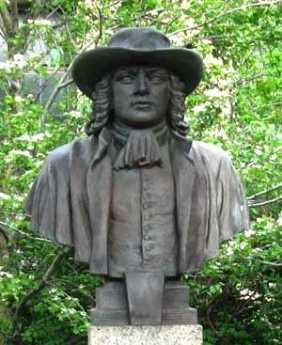 .
.
Times Penn Spent in Delco: by Thomas R. Smith,
Impersonations of William Penn by Thomas R. Smith focus here on early days in Delaware County, formerly Chester County.
A Brief WILLIAM PENN CHRONOLOGY, 1644-1718
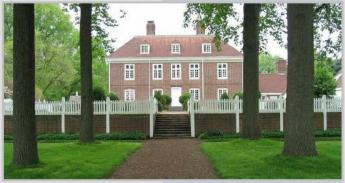 .
.
The Origin of States Rights, a Rumination
The clamor for States Rights probably began with Virginia's claims for western territories.
On the Making of Boundaries: PA/NY
 Pennsylvania's northern boundary with New York helped settle a more serious argument about boundaries with Connecticut.
Pennsylvania's northern boundary with New York helped settle a more serious argument about boundaries with Connecticut.